#originofchristianity
Text
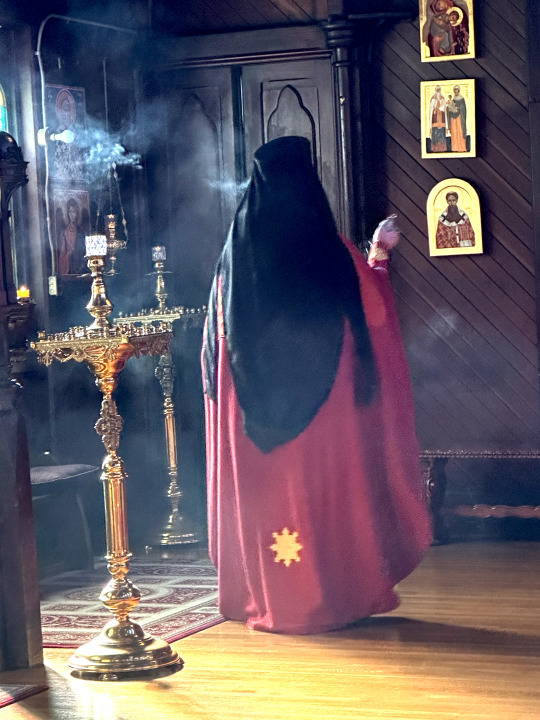
20 notes
·
View notes
Text
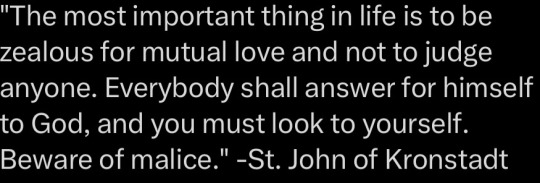

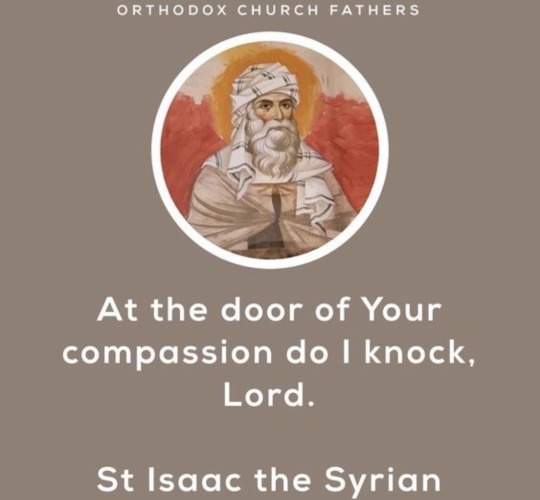


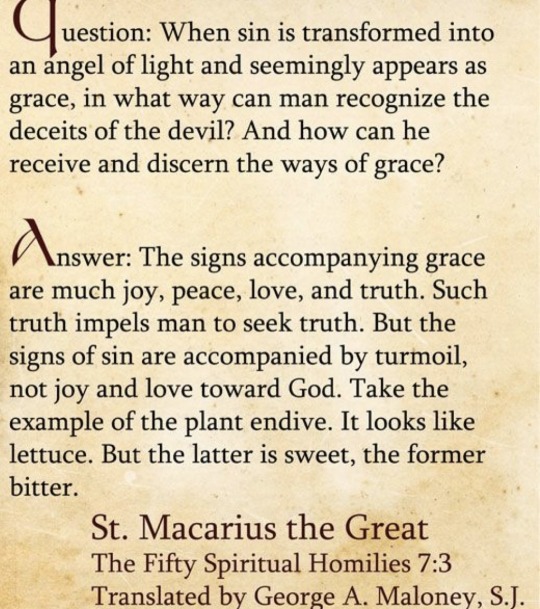
10 notes
·
View notes
Text
Saints &Reading: Wednesday, February 21, 2024
february 8_february 21
E PROPHET ZECHARIAH (ZAKHARIAH) THE SICKLE-SEER FROM AMONGST THE 12MINOR PROPHETS (520 BC)
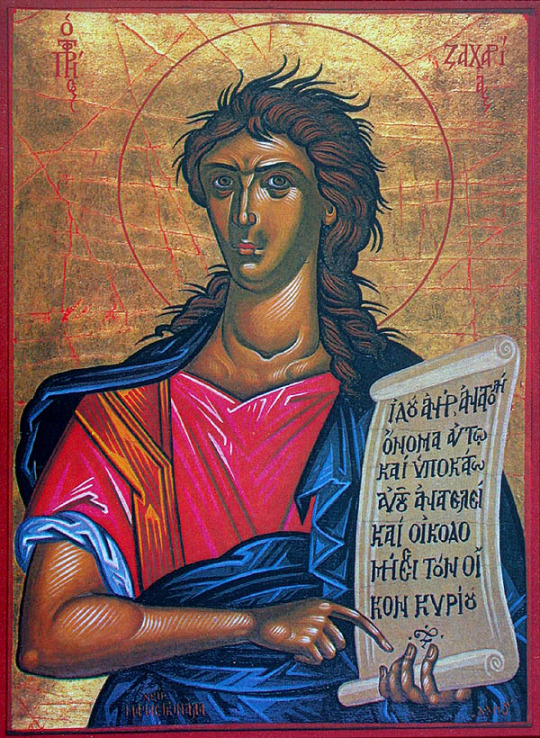
The Prophet Zachariah the Sickle-Seer the eleventh of the twelve Minor Prophets. He was descended from the tribe of Levi, and seems to have been a priest (Nehemiah 12:4,16). He was called to prophetic service at a young age and became, in the wondrous expression of church hymnology, “a spectator of supra-worldly visions.”
The Book of the Prophet Zachariah contains inspired details about the coming of the Messiah (Zach 6:12); about the last days of the Savior’s earthly life, about the Entry of the Lord into Jerusalem on a young donkey (Zach 9:9); about the betrayal of the Lord for thirty pieces of silver and the purchase of the potter’s field with them (Zach 11:12-13); about the piercing of the Savior’s side (Zach 12:10); about the scattering of the apostles from the Garden of Gethsemane (Zach 13:7); about the eclipse of the sun at the time of the Crucifixion (Zach 14:6-7).
“Enlightened by dawnings all above,” the Prophet Zachariah, “saw the future as it were the present.” According to Tradition, this “most true God-proclaimer” lived to old age and was buried near Jerusalem, beside his illustrious contemporary and companion, the Prophet Haggai (December 16). The title “Sickle-Seer” given Zachariah comes from a vision in which he saw a sickle flying in the air, destroying thieves and perjurors (Zach 5:1-3).
The holy Prophet Zachariah died around 520 B.C. His tomb was discovered in 415 in a village near Eleutheropolis (Sozomen, Hist. Eccles. VI:32, IX:17). At the prophet’s feet was the body of a child dressed in royal accouterments. His holy relics were transferred to the church of Saint James the Brother of the Lord (October 23) in Constantinople.

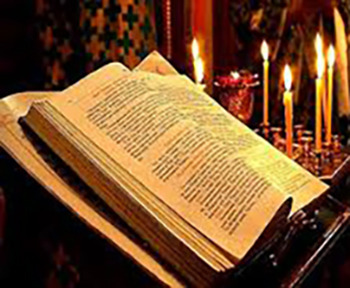
1 PETER 4:1-11
1Therefore, since Christ suffered for us in the flesh, arm yourselves also with the same mind, for he who has suffered in the flesh has ceased from sin, 2 that he no longer should live the rest of his time in the flesh for the lusts of men, but for the will of God. 3 For we have spent enough of our past lifetime in doing the will of the Gentiles-when we walked in lewdness, lusts, drunkenness, revelries, drinking parties, and abominable idolatries. 4 In regard to these, they think it strange that you do not run with them in the same flood of dissipation, speaking evil of you. 5 They will give an account to Him who is ready to judge the living and the dead. 6For this reason the gospel was preached also to those who are dead, that they might be judged according to men in the flesh, but live according to God in the spirit. 7 But the end of all things is at hand; therefore be serious and watchful in your prayers. 8 And above all things have fervent love for one another, for "love will cover a multitude of sins." 9 Be hospitable to one another without grumbling.10 As each one has received a gift, minister it to one another, as good stewards of the manifold grace of God. 11 If anyone speaks, let him speak as the oracles of God. If anyone ministers, let him do it as with the ability which God supplies, that in all things God may be glorified through Jesus Christ, to whom belong the glory and the dominion forever and ever. Amen.
MARK 12:28-37
28 Then one of the scribes came, and having heard them reasoning together, perceiving that He had answered them well, asked Him, "Which is the first commandment of all?" 29 Jesus answered him, "The first of all the commandments is: 'Hear, O Israel, the LORD our God, the LORD is one. 30 'And you shall love the LORD your God with all your heart, with all your soul, with all your mind, and with all your strength.' This is the first commandment. 31 And the second, like it, is this: 'You shall love your neighbor as yourself.' There is no other commandment greater than these. 32 So the scribe said to Him, "Well said, Teacher. You have spoken the truth, for there is one God, and there is no other but He. 33 And to love Him with all the heart, with all the understanding, with all the soul, and with all the strength, and to love one's neighbor as oneself, is more than all the whole burnt offerings and sacrifices. 34 Now when Jesus saw that he answered wisely, He said to him, "You are not far from the kingdom of God." But after that no one dared question Him. 35 Then Jesus answered and said, while He taught in the temple, "How is it that the scribes say that the Christ is the Son of David? 36 For David himself said by the Holy Spirit:'The LORD said to my Lord, Sit at My right hand, Till I make Your enemies Your footstool." ' 37 Therefore David himself calls Him 'Lord'; how is He then his Son? And the common people heard Him gladly.
#orthodoxy#orthodoxchristianity#easternorthodoxchurch#originofchristianity#spirituality#holyscriptures#gospel#bible#wisdom#saints
10 notes
·
View notes
Text

11 notes
·
View notes
Text
Saints&Reading: Tuesday , January 23, 2024
january 9_january 23
ST. THEOPHAN THE RECLUSE, BISHOP OF TAMBOV (1894)
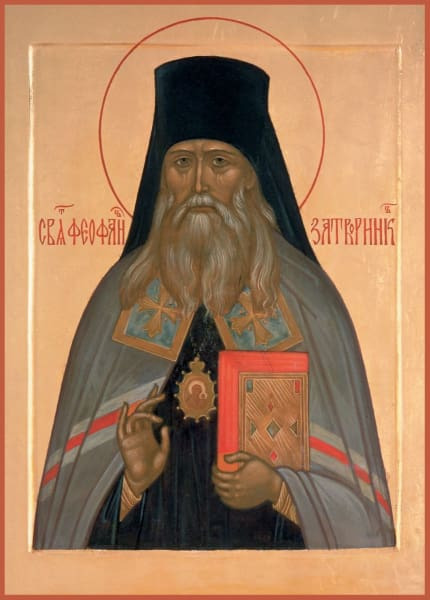
George Govorov, the future Saint Theophan, was born on January 10, 1815 in the village of Chernavsk in the Orlov province where his father was a priest.
At first, George attended a primary school at Liven, then a military school. From 1837-1841 he studied at the Kiev Theological Academy, and probably visited the Monastery of the Caves several times. In these surroundings, it was not surprising that he received the monastic tonsure while he was still a student. After graduation Hieromonk Theophan was appointed rector of Kiev’s church schools, and later became rector of the seminary in Novgorod. Before he retired from teaching, Father Theophan served as a professor and Assistant Inspector at the Petersburg Academy.
Saint Theophan was not completely happy with academic work, so he asked to be relieved of his duties. He was assigned to be a member of the Russian Mission in Jerusalem. After being raised to the rank of Archimandrite, he became Rector of Olnets Seminary. Soon he was assigned as the chief priest of the embassy church in Constantinople. Saint Theophan was eventually recalled to Russia to become rector of the Petersburg Academy, and supervisor of religious education in the capital’s secular schools.
On May 9, 1859 Saint Theophan was consecrated as Bishop of Tambov, where he established a diocesan school for girls. During his time in Tambov he came to love the secluded Vysha Monastery in his diocese. In 1863 he was transferred to Vladimir and remained there for three years. He also established a diocesan school for girls at Vladimir.
The holy bishop visited parishes throughout his diocese serving, preaching, restoring churches, and sharing the joys and sorrows of his flock. It was very difficult for Bishop Theophan to live in the world and become involved with vain worldly disputes. Many abused his trust, but he could not bring himself to chastise anyone. Instead, he left such unpleasant tasks to the Archpriest of his cathedral.
He was present at the uncovering of the relics of Saint Tikhon of in 1861, and this made a tremendous impression on him, for he had much in common with that saint. He had loved Saint Tikhon from early childhood, and always spoke about him with great enthusiasm. When Saint Tikhon was glorified as a saint on August 13, Bishop Theophan’s joy knew no bounds.
In 1866 his request to be relieved of his duties as Bishop of Vladimir was granted. He was appointed as Superior of the Vysha Monastery, but soon resigned from that position. He was permitted to live there and to celebrate services whenever he wished. He also received a pension of 1000 rubles.
As he prepared to leave his diocese, he wished to focus on his own salvation, and to concentrate on undisturbed communion with God. On July 24, 1866 he bade his diocese farewell, leaving the world for a life of reclusion, and to devote himself to writing spiritual books. Through these books, Saint Theophan has become the spiritual benefector of all Orthodox Christians. Although he sought the Kingdom of God and His righteousness (Mt. 6:33), a reputation as a writer of great significance for the whole world was also added to him.
Bishop Theophan wrote many books, but received no profits from their sale. He tried to keep them as inexpensive as possible, and they quickly sold out. He wrote about topics which others before him had not fully treated, such as how to live a Christian life, how to overcome sinful habits, and how to avoid despair. He tried to explain the steps of spiritual perfection systematically, as one who had himself gone through these various steps. Some of his books include The Spiritual Life and How to be Attuned to It, The Path to Salvation, and Letters on the Spiritual Life. He also translated the Philokalia in five volumes, and The Sermons of Saint Simeon the New Theologian.
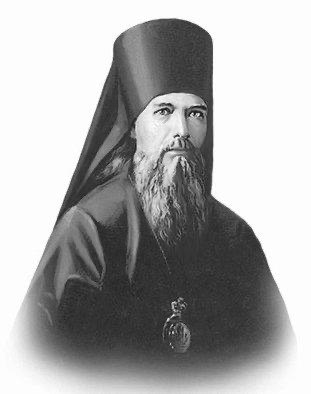
For the first six years in the monastery, Bishop Theophan attended all the services, including the early Liturgy. He stood still in church with his eyes closed so that he would not be distracted. He often celebrated Liturgy on Sundays and Feast Days.
Beginning in 1872, he cut off all relationships with people (except for his confessor) and no longer left his cell to attend church. He built a small chapel in his quarters and dedicated it to the Lord’s Baptism. For ten years he served there on Sundays and Feast Days. For the last eleven years of his life he served every day by himself. Sometimes he would sing, and sometimes he kept completely silent.
Whenever anyone visited him on business, Bishop Theophan would reply with as few words as possible, then immerse himself in prayer. If anyone sent him money, he would distribute it to the poor, keeping only a small portion to purchase books.
Whenever he was not occupied with writing or praying, the reclusive bishop worked at carpentry or painting icons. He received from twenty to forty letters each day, and he answered all of them. He was able to discern each writer’s spiritual condition, then give detailed answers to the questions of those who were struggling for the salvation of their souls.
His eyesight deteriorated in his latter years, but he did not curtail his work because of it. In the evening, his cell attendant would prepare everything for the bishop to serve Liturgy the next morning. After finishing the Liturgy, Bishop Theophan would knock on the wall to signal the cell attendant to serve him tea. On days when there was no fasting, he would eat lunch at 1:00 P.M. This consisted of one egg and a glass of milk. At four o’clock he would have some tea, and then no more food that day.
Bishop Theophan began to get weaker at the beginning of 1894. He was still writing on the afternoon of January 6, but when the cell attendant came to check on him at 4:30 he found that the bishop had departed to the Lord.
Saint Theophan’s body lay in the small church in his cell for three days, then three more days in the cathedral. There was no trace of corruption, however. He was laid to rest in the Kazan church of the Vysha Monastery.
Several of Saint Theophan’s books have been translated into English, and are reliable spiritual guides for Orthodox Christians of today. Saint Theophan’s gift was the ability to present the wisdom of the Fathers in terms which modern people can understand. Since he lived close to our own time, many readers find his books “more approachable” than the earlier patristic literature. He treats the life of the soul and the life of the body as a unified whole, not as two separate elements, and reveals to people the path of salvation.
SAINT THEOSEBIA, THE DEACONESS SISTER OF ST BASIL AND GREGORY OF NYSSA (385)
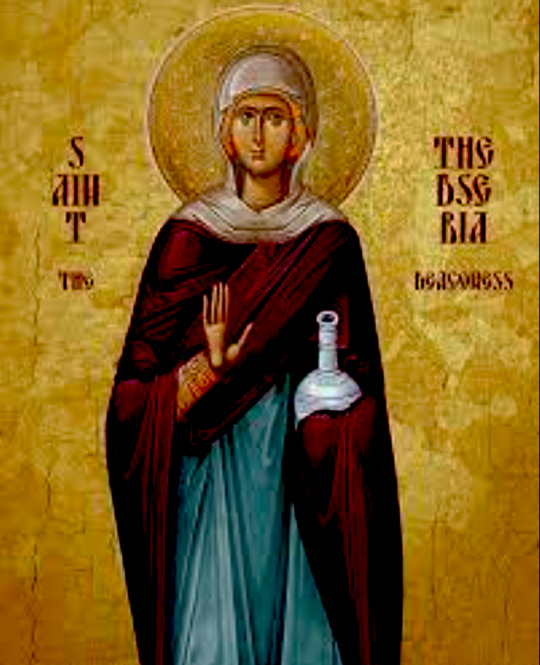
Saint Theosebia the Deaconess was the sister of Saints Basil the Great, Gregory, afterward Bishop of Nyssa, and Peter, Bishop of Sebaste. She was a virgin and served the Holy Church as a deaconess, caring for the sick, distributing food to vagrants, raising orphans and preparing women for holy Baptism.
When her brother, Saint Gregory of Nyssa, was in exile for three years, Saint Theosebia was with him and she shared in all the tribulations of a life of wandering. Saint Theosebia died in 385, and Saint Gregory the Theologian praised her in a eulogy.
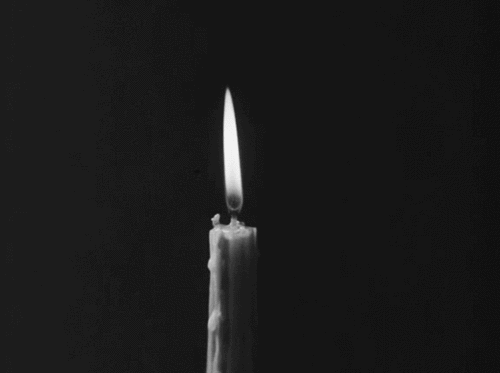
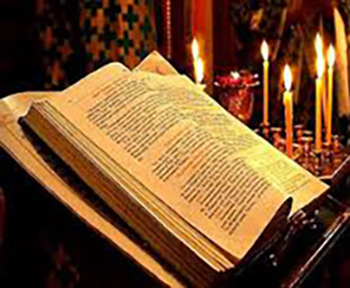
HEBREWS 9:8-10, 15-23
8 the Holy Spirit indicating this, that the way into the Holiest of All was not yet made manifest while the first tabernacle was still standing. 9 It was symbolic for the present time in which both gifts and sacrifices are offered which cannot make him who performed the service perfect in regard to the conscience- 10 concerned only with foods and drinks, various washings, and fleshly ordinances imposed until the time of reformation. 15 And for this reason He is the Mediator of the new covenant, by means of death, for the redemption of the transgressions under the first covenant, that those who are called may receive the promise of the eternal inheritance. 16 For where there is a testament, there must also of necessity be the death of the testator. 17 For a testament is in force after men are dead, since it has no power at all while the testator lives. 18 Therefore not even the first covenant was dedicated without blood. 19 For when Moses had spoken every precept to all the people according to the law, he took the blood of calves and goats, with water, scarlet wool, and hyssop, and sprinkled both the book itself and all the people, 20 saying, "This is the blood of the covenant which God has commanded you." 21 Then likewise he sprinkled with blood both the tabernacle and all the vessels of the ministry. 22 And according to the law almost all things are purified with blood, and without shedding of blood there is no remission. 23 Therefore it was necessary that the copies of the things in the heavens should be purified with these, but the heavenly things themselves with better sacrifices than these.
JOHN 10:9-16
9I am the door. If anyone enters by Me, he will be saved, and will go in and out and find pasture. 10 The thief does not come except to steal, and to kill, and to destroy. I have come that they may have life, and that they may have it more abundantly. 11 I am the good shepherd. The good shepherd gives His life for the sheep. 12 But a hireling, he who is not the shepherd, one who does not own the sheep, sees the wolf coming and leaves the sheep and flees; and the wolf catches the sheep and scatters them. 13 The hireling flees because he is a hireling and does not care about the sheep. 14 I am the good shepherd; and I know My sheep, and am known by My own. 15 As the Father knows Me, even so I know the Father; and I lay down My life for the sheep.
#orthodoxy#orthodoxchristianity#easternorthodoxchurch#originofchristianity#spirituality#holyscriptures#gospel#bible#saints#wisdom
10 notes
·
View notes
Text
Saints&Reading: Saturday, April 13, 2024
march 31_april 13
SAINT INNOCENT OF MOSCOW, ENLIGHTNER OF ALASKA ANS SIBERIA (1879)
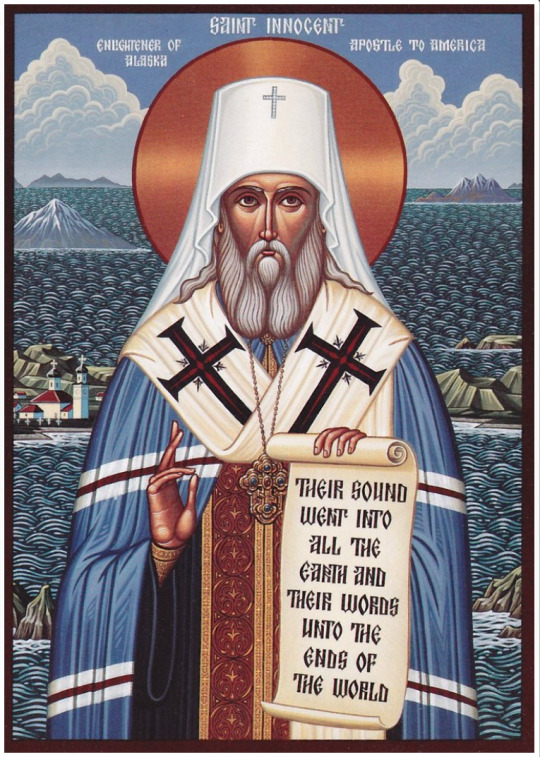
Icon written by hieroscemamonk Ephrem.
Our father among the saints Innocent of Alaska, Equal-to-the-Apostles and Enlightener of North America (1797-1879), was a Russian Orthodox priest, bishop, archbishop, and Metropolitan of Moscow and all Russia. He is known for his missionary work, scholarship, and leadership in Alaska and the Russian Far East during the 1800s. He is known for his great zeal for his work as well as his great abilities as a scholar, linguist, and administrator. He was a missionary, later a bishop and archbishop in Alaska and the Russian Far East. He learned several native languages and was the author of many of the earliest scholarly works about the natives and their languages, as well as dictionaries and religious works in these languages. He also translated parts of the Bible into several native languages.
St. Innocent, né Ivan (John) Evseyevich Popov-Veniaminov, was born on August 26, 1797, into the family of a church server in the village of Anginskoye, Verkholensk District, Irkutsk province, in Russia. His father died when John was six.
In 1807, John entered the Irkutsk Theological Seminary. In 1817 he married, and on May 18, 1817 he was ordained deacon of the Church of the Annunciation in Irkutsk. He completed his studies in 1818. He was appointed a teacher in a parish school, and on May 18, 1821 he was ordained priest to serve in the Church of the Annunciation.
At the beginning of 1823, Bishop Michael of Irkutsk received instructions to send a priest to the island of Unalaska in the Aleutian Islands of Alaska. Father John Veniaminov volunteered to go, and on May 7, 1823, he departed from Irkutsk, accompanied by his aging mother, his wife, his infant son Innocent, and his brother Stefan. After a difficult one-year journey, they arrived at Unalaska on July 29, 1824.
After John and his family built and moved into an earthen hut, he undertook the construction of a church on the island and set about studying the local languages and dialects. He trained some of his parishioners in construction techniques and with them undertook the construction of a church, which was finished the following July.
Father John's parish included the island of Unalaska and the neighboring Fox Islands and Pribilof Islands, whose inhabitants had been converted to Christianity before his arrival, but retained many of their pagan ways and customs. Father John often traveled between the islands in a canoe, battling the stormy Gulf of Alaska.
His travels over the islands greatly enhanced Father John Veniaminov's familiarity with the local dialects. In a short time he mastered six of the dialects. He devised an alphabet of Cyrillic letters for the most widespread dialect, the Unagan dialect of Aleut and, in 1828, translated the Holy Gospel of St. Matthew and other church materials into that dialect, which were eventually published in 1840 with the blessing of the Holy Synod of the Russian Orthodox Church. In 1829, he journeyed to the Bering Sea coast of the Alaskan mainland and preached to the people there. In 1836, his travels even extended to the south, to the Ross Colony north of San Francisco and to the Spanish missions of northern California. At Ross Colony he conducted services at its small, wooden chapel.
In 1834, Father John was transferred to Sitka Island, to the town of Novoarkhangelsk, later called Sitka. He devoted himself the Tlingit people and studied their language and customs. His studies there produced the scholarly works Notes on the Kolushchan and Kodiak Tongues and Other Dialects of the Russo-American Territories, with a Russian-Kolushchan Glossary.
In 1838, Father John journeyed to St. Petersburg and Moscow, Russia, and Kiev, Ukraine, to report on his activities and request an expansion of the Church's activities in Russian America. While he was there, he received notice that his wife had died. He requested permission to return to Sitka. Instead, it was suggested that he take vows as a monk. Father John at first ignored these suggestions, but, on November 29, 1840, made his vows. He chose the name Innocent in honor of Bishop Innocent of Irkutsk.
On December 15, 1840, Archimandrite Innocent Veniaminov was consecrated Bishop of Kamchatka and Kuril Islands in Russia and the Aleutian Islands in Russian America. His see was located in Novoarkhangelsk, which he returned to in September 1841. He spent the next nine years in the administration of his see as well as on several long missionary journeys to its remote areas. On April 21, 1850, Bishop lnnocent was elevated to Archbishop. In 1852, the Yakut area was admitted to the Kamchatka Diocese, and in September 1853, Archbishop Innocent took up permanent residence in the town of Yakutsk. Innocent took frequent trips throughout his enlarged diocese. He devoted much energy to the translation of the scriptures and service books into the Yakut (Sakha) language.
In April 1865, Archbishop Innocent was appointed a member of the Holy Governing Synod of the Church.
On November 19, 1867, he was appointed the Metropolitan of Moscow, replacing his friend and mentor, Filaret, who had died. While there, he undertook revisions of many Church texts that contained errors, raised funds to improve the living conditions of priests and established a retirement home for priests.
Innocent died on March 31, 1879. He was buried on April 5, 1879, at Troitse-Sergiyeva Lavra.
Source: St Innocent Church
VENERABLE HYPATIUS, MONK HEALER OF THE KIEV CAVE (14th.c.)

Saint Hypatius the Healer of the Caves, attained glory through his severe fasting and prayerful vigilance. By night he stood at prayer, slept very little, and ate only bread and water.
Saint Hypatius devoted himself entirely to the service of the sick, and received from God the gift of healing. Those sick with various illnesses often hastened to his prayerful intercession.
The memory of Saint Hypatius is celebrated also on August 28, on the Synaxis of the Saints of the Far Caves.


1 CORINTHIANS 15:47-57
47 The first man was of the earth, made of dust; the second Man is the Lord from heaven. 48 As was the man of dust, so also are those who are made of dust; and as is the heavenly Man, so also are those who are heavenly. 49 And as we have borne the image of the man of dust, we shall also bear the image of the heavenly Man. 50 Now this I say, brethren, that flesh and blood cannot inherit the kingdom of God; nor does corruption inherit incorruption. 51 Behold, I tell you a mystery: We shall not all sleep, but we shall all be changed- 52 in a moment, in the twinkling of an eye, at the last trumpet. For the trumpet will sound, and the dead will be raised incorruptible, and we shall be changed. 53 For this corruptible must put on incorruption, and this mortal must put on immortality. 54 So when this corruptible has put on incorruption, and this mortal has put on immortality, then shall be brought to pass the saying that is written: "Death is swallowed up in victory."55 O Death, where is your sting? O Hell, where is your victory? 56 The sting of death is sin, and the strength of sin is the law. 57 But thanks be to God, who gives us the victory through our Lord Jesus Christ.
MARK 7:31-37
31 Again, departing from the region of Tyre and Sidon, He came through the midst of the region of Decapolis to the Sea of Galilee. 32 Then they brought to Him one who was deaf and had an impediment in his speech, and they begged Him to put His hand on him. 33 And He took him aside from the multitude, and put His fingers in his ears, and He spat and touched his tongue. 34 Then, looking up to heaven, He sighed, and said to him, "Ephphatha," that is, "Be opened." 35 Immediately his ears were opened, and the impediment of his tongue was loosed, and he spoke plainly. 36 Then He commanded them that they should tell no one; but the more He commanded them, the more widely they proclaimed it. 37 And they were astonished beyond measure, saying, "He has done all things well. He makes both the deaf to hear and the mute to speak."
#orthodoxy#orthodoxchristianity#easternorthodoxchurch#originofchristianity#spirituality#holyscriptures#gospel#wisdom#saints
6 notes
·
View notes
Text

9 notes
·
View notes
Text
Saints&Reading: Monday, March 4, 2024
february 20_march 4
Week of the prodigal son
ABBOT MACARIUS AND 34 MONKS AND NOVICES OF VALAAM MONASTERY MARTYRED BY THE LUTHERANS

In Memoriam: hieromonk Titus, schemamonk Tikhon, monks Gelasius, Sergius, Varlaam, Sabbas, Conon, Silvester, Cyprian, Pimen, John, Simonas, Jonah, David, Cornelius, Niphon, Athanasius, and Serapion, and novices Varlaam, Athanasius, Anthony, Luke, Leontius, Thomas, Dionysius, Philip, Ignatius, Basil, Pachomius, Basil, Theophilus, John, Theodore, and John (1578).
ST. BESSARION THE GREAT, WONDERWORKER OF EGYPT (466)
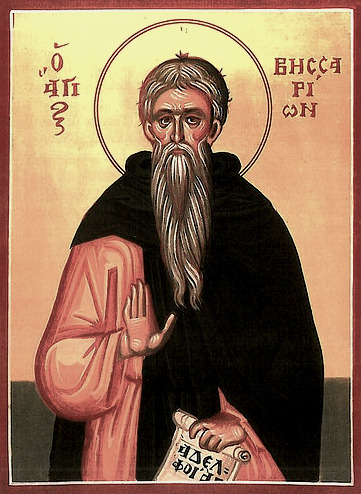
Saint Bessarion, Wonderworker of Egypt was an Egyptian. He was baptized while still in his youth, and he led a strict life, striving to preserve the grace given him during Baptism. Seeking to become more closely acquainted with the monastic life, he journeyed to the holy places. He was in Jerusalem, he visited Saint Gerasimus (March 4) in the Jordanian wilderness, he viewed other desert monasteries, and assimilated all the rules of monastic life.
Upon his return, he received monastic tonsure and became a disciple of Saint Isidore of Pelusium (February 4). Saint Bessarion took a vow of silence, and partook of food only once a week. Sometimes he remained without food or drink for forty days. Once, the saint stood motionless for forty days and forty nights without food or sleep, immersed in prayer.
Saint Bessarion received from God the gift of wonderworking. When his disciple was very thirsty, he sweetened bitter water. By his prayer the Lord sent rain upon the earth, and he could cross a river as if on dry land. With a single word he cast out devils, but he did this privately to avoid glory.
His humility was so great that once, when a priest ordered someone from the skete to leave church for having fallen into sin, Bessarion also went with him saying, “I am a sinner, too.” Saint Bessarion slept only while standing or sitting. A large portion of his life was spent under the open sky in prayerful solitude. He peacefully departed to the Lord in his old age.
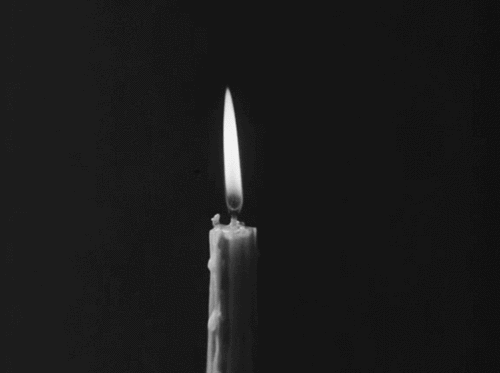
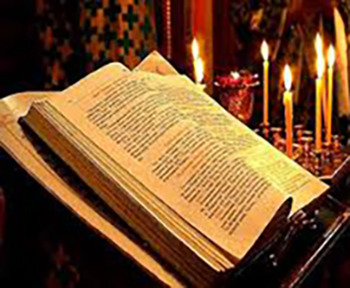
1 JOHN 2:18-3:10
18 Little children, it is the last hour; and as you have heard that the Antichrist is coming, even now many antichrists have come, by which we know that it is the last hour. 19 They went out from us, but they were not of us; for if they had been of us, they would have continued with us; but they went out that they might be made manifest, that none of them were of us. 20 But you have an anointing from the Holy One, and you know all things. 21 I have not written to you because you do not know the truth, but because you know it, and that no lie is of the truth. 22 Who is a liar but he who denies that Jesus is the Christ? He is antichrist who denies the Father and the Son. 23 Whoever denies the Son does not have the Father either; he who acknowledges the Son has the Father also. 24 Therefore let that abide in you which you heard from the beginning. If what you heard from the beginning abides in you, you also will abide in the Son and in the Father. 25 And this is the promise that He has promised us-eternal life. 26These things I have written to you concerning those who try to deceive you. 27 But the anointing which you have received from Him abides in you, and you do not need that anyone teach you; but as the same anointing teaches you concerning all things, and is true, and is not a lie, and just as it has taught you, you will abide in Him. 28 And now, little children, abide in Him, that when He appears, we may have confidence and not be ashamed before Him at His coming. 29 If you know that He is righteous, you know that everyone who practices righteousness is born of Him.
1 Behold what manner of love the Father has bestowed on us, that we should be called children of God! Therefore the world does not know us, because it did not know Him. 2 Beloved, now we are children of God; and it has not yet been revealed what we shall be, but we know that when He is revealed, we shall be like Him, for we shall see Him as He is. 3 And everyone who has this hope in Him purifies himself, just as He is pure. 4 Whoever commits sin also commits lawlessness, and sin is lawlessness. 5 And you know that He was manifested to take away our sins, and in Him there is no sin. 6 Whoever abides in Him does not sin. Whoever sins has neither seen Him nor known Him. 7 Little children, let no one deceive you. He who practices righteousness is righteous, just as He is righteous. 8 He who sins is of the devil, for the devil has sinned from the beginning. For this purpose the Son of God was manifested, that He might destroy the works of the devil. 9 Whoever has been born of God does not sin, for His seed remains in him; and he cannot sin, because he has been born of God. 10 In this the children of God and the children of the devil are manifest: Whoever does not practice righteousness is not of God, nor is he who does not love his brother.
MARK 11:1-11
1 Now when they drew near Jerusalem, to Bethphage and Bethany, at the Mount of Olives, He sent two of His disciples; 2 and He said to them, "Go into the village opposite you; and as soon as you have entered it you will find a colt tied, on which no one has sat. Loose it and bring it. 3 And if anyone says to you, 'Why are you doing this?' say, 'The Lord has need of it,' and immediately he will send it here. 4 So they went their way, and found the colt tied by the door outside on the street, and they loosed it. 5 But some of those who stood there said to them, "What are you doing, loosing the colt?" 6 And they spoke to them just as Jesus had commanded. So they let them go. 7 Then they brought the colt to Jesus and threw their clothes on it, and He sat on it. 8 And many spread their clothes on the road, and others cut down leafy branches from the trees and spread them on the road. 9 Then those who went before and those who followed cried out, saying:"Hosanna! 'Blessed is He who comes in the name of the LORD!' 10 Blessed is the kingdom of our father David That comes in the name of the Lord! Hosanna in the highest!" 11 And Jesus went into Jerusalem and into the temple. So when He had looked around at all things, as the hour was already late, He went out to Bethany with the twelve.
#orthodoxy#orthodoxchristianity#easternorthodoxchurch#originofchristianity#spirituality#holyscriptures#gospel#bible#wisdom#saints
7 notes
·
View notes
Text
Feast,Saints&Reading: Sunday, March 24, 2024
march 11_march24

First Sunday of the Great Lent: Triumph of Orthodoxy

The first Sunday of Great Lent is called the Sunday of Orthodoxy because it commemorates the Holy Icons's restoration and the Orthodox Faith's triumph against the terrible heresy of the Iconoclasts, i.e., those heretics who refused to honor the Holy Icons. For over a hundred years, the Church was disturbed by the evil doctrine of iconoclasm.
The first Emperor to persecute the Church was Leo the Isaurian, and the last was Theophilos, the spouse of Saint Theodora (February 11), who reigned after her husband's death and re-established Orthodoxy in the time of Patriarch Methodios (June 14). Empress Theodora proclaimed publicly that we do not kiss the Icons as a sign of worship, nor do we honor them as "gods," but as images of their prototypes.
In the year 843, on the first Sunday of the Fast, Saint Theodora and her son, Emperor Michael, venerated the Holy Icons together with the clergy and the people. Since that time this event has been commemorated every year, because it was definitively determined that we do not worship the Icons, but we honor and glorify all the Saints who are depicted on them. We worship only the Triune God: the Father, the Son and the Holy Spirit, and no one else, neither a Saint, nor an Angel.
The Holy Prophets Moses, Aaron, and Samuel were initially commemorated on this Sunday. The Alleluia verses appointed for today’s Liturgy reflect this older usage.
SAINT SOPHRONIUS, PATRIARCH OF JERUSALEM (638)
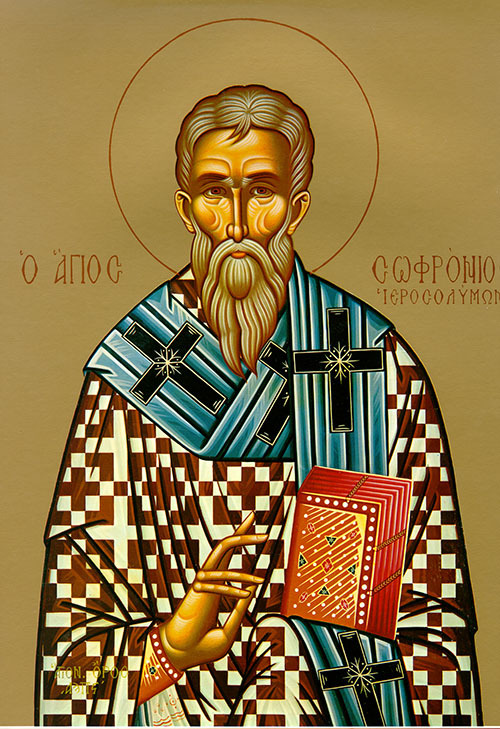
Saint Sophronius, Patriarch of Jerusalem, was born in Damascus around 560. From his youth, he was distinguished for his piety and love of classical studies. He was incredibly proficient in philosophy, and so he was known as Sophronius the Wise. The future hierarch, however, sought the true philosophy of monasticism and conversations with desert dwellers.
He arrived in Jerusalem at the monastery of Saint Theodosius, and there he became close with the hieromonk John Moschus, becoming his spiritual son and submitting himself to him in obedience. They visited several monasteries, writing down the lives and spiritual wisdom of the ascetics they met. From these notes emerged their renowned book, the LEIMONARION or SPIRITUAL MEADOW, which was highly esteemed at the Seventh Ecumenical Council.
To save themselves from the devastating incursions of the Persians, Saints John and Sophronius left Palestine and went to Antioch, and from there they went to Egypt. In Egypt, Saint Sophronius became seriously ill. During this time he decided to become a monk and was tonsured by Saint John Moschus.
After Saint Sophronius recovered his health, they both decided to remain in Alexandria. There they were received by the holy Patriarch John the Merciful (November 12), to whom they rendered great aid in the struggle against the Monophysite heresy. At Alexandria Saint Sophronius had an affliction of the eyes, and he turned with prayer and faith to the holy Unmercenaries Cyrus and John (January 31), and he received healing in a church named for them. In gratitude, Saint Sophronius then wrote the Lives of these holy Unmercenaries.
When the barbarians began to threaten Alexandria, Patriarch John, accompanied by Saints Sophronius and John Moschus, set out for Constantinople, but he died along the way. Saints John Moschus and Sophronius then set out for Rome with eighteen other monks. Saint John Moschus died at Rome. His body was taken to Jerusalem by Saint Sophronius and buried at the monastery of Saint Theodosius.
In the year 628, Patriarch Zacharias of Jerusalem (609-633) returned from his captivity in Persia. After his death, the patriarchal throne was occupied for two years by Saint Modestus (December 18). After the death of Saint Modestus, Saint Sophronius was chosen Patriarch. Saint Sophronius toiled much for the welfare of the Jerusalem Church as its primate (634-644).
Toward the end of his life, Saint Sophronius and his flock lived through a two year siege of Jerusalem by the Moslems. Worn down by hunger, the Christians finally agreed to open the city gates, on the condition that the enemy spare the holy places. But this condition was not fulfilled, and Saint Sophronius died in grief over the desecration of the Christian holy places.
Written works by Patriarch Sophronius have come down to us in the area of dogmatics, and likewise his “Excursus on the Liturgy,” the Life of Saint Mary of Egypt (April 1), and also about 950 troparia and stikheras from Pascha to the Ascension.
While still a hieromonk, Saint Sophronius reviewed and corrected the Rule of the monastery of Saint Savva the Sanctified (December 5). The saint’s three Canons for the Holy Forty-Day Great Fast are included in the contemporary Lenten Triodion.
Source: Orthodox Church in America_OCA
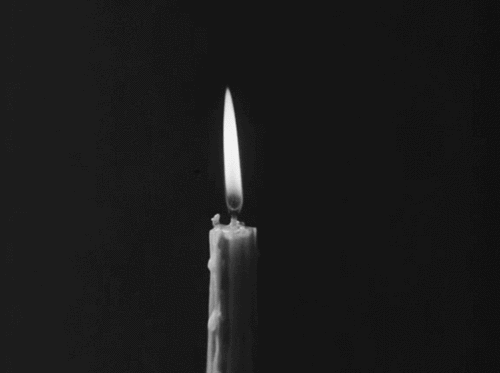

HEBREWS 11:24-26, 11:32-12:2
24 By faith Moses, when he became of age, refused to be called the son of Pharaoh's daughter, 25 choosing rather to suffer affliction with the people of God than to enjoy the passing pleasures of sin, 26 esteeming the reproach of Christ greater riches than the treasures in Egypt; for he looked to the reward. 32 And what more shall I say? For the time would fail me to tell of Gideon and Barak and Samson and Jephthah, also of David and Samuel and the prophets: 33 who through faith subdued kingdoms, worked righteousness, obtained promises, stopped the mouths of lions, 34 quenched the violence of fire, escaped the edge of the sword, out of weakness were made strong, became valiant in battle, turned to flight the armies of the aliens. 35 Women received their dead raised to life again. Others were tortured, not accepting deliverance, that they might obtain a better resurrection. 36 Still others had trials of mockings and scourgings, yes, and of chains and imprisonment. 37 They were stoned, were sawn in two, were tempted, and were slain with the sword. They wandered about in sheepskins and goatskins, being destitute, afflicted, tormented- 38 of whom the world was not worthy. They wandered in deserts and mountains, in dens and caves of the earth. 39 And all these, having obtained a good testimony through faith, did not receive the promise, 40 God having provided something better for us, that they should not be made perfect apart from us.
1 Therefore we also, since we are surrounded by so great a cloud of witnesses, let us lay aside every weight, and the sin which so easily ensnares us, and let us run with endurance the race that is set before us, 2 looking unto Jesus, the author and finisher of our faith, who for the joy that was set before Him endured the cross, despising the shame, and has sat down at the right hand of the throne of God.
JOHN 1:43-51
43 The following day Jesus wanted to go to Galilee, and He found Philip and said to him, "Follow Me." 44 Now Philip was from Bethsaida, the city of Andrew and Peter. 45 Philip found Nathanael and said to him, "We have found Him of whom Moses in the law, and also the prophets, wrote-Jesus of Nazareth, the son of Joseph." 46 And Nathanael said to him, "Can anything good come out of Nazareth?" Philip said to him, "Come and see." 47 Jesus saw Nathanael coming toward Him, and said of him, "Behold, an Israelite indeed, in whom is no deceit!" 48 Nathanael said to Him, "How do You know me?" Jesus answered and said to him, "Before Philip called you, when you were under the fig tree, I saw you." 49 Nathanael answered and said to Him, "Rabbi, You are the Son of God! You are the King of Israel!" 50 Jesus answered and said to him, "Because I said to you, 'I saw you under the fig tree,' do you believe? You will see greater things than these." 51 And He said to him, "Most assuredly, I say to you, hereafter you shall see heaven open, and the angels of God ascending and descending upon the Son of Man."
#orthodoxy#orthodoxchristianity#easternorthodoxchurch#originofchristianity#spirituality#holyscriptures#gospel#bible#wisdom#saints
6 notes
·
View notes
Text
Saints&Reading: Wednesday, 13, March, 2024
march 1_march 29
VENERABLE JOHN CASSIAN THE ROMAN, ABBOT (435)

Saint John Cassian the Roman was born around 360, probably in Lesser Scythia (in Dacia Pontica). His pious Christian parents gave him an excellent classical education, and also instructed him in the Holy Scriptures and in the spiritual life.
Saint John entered a monastery in the diocese of Tomis, where his friend and relative Saint Germanus labored as an ascetic. In 380, desiring to venerate the Holy Places, Saint John went to Jerusalem with his sister and his friend Saint Germanus. The two monks stayed at a Bethlehem monastery, not far from where the Savior was born.
After five years at the monastery, Saints John and Germanus traveled through the Thebaid and the desert monasteries of Sketis for seven years, drawing upon the spiritual experience of countless ascetics. The Egyptian monks taught them many useful things about spiritual struggles, prayer, and humility. Like honeybees they journeyed from place to place, gathering the sweet nectar of spiritual wisdom. The notes Saint John made formed the basis of his book called CONFERENCES WITH THE FATHERS in twenty-four chapters.
Returning to Bethlehem for a brief time, the spiritual brothers lived for three years in complete solitude. Then they went back to Egypt and lived there until 399. Because of the disturbances caused by Archbishop Theophilus of Alexandria to the monasteries along the Nile, they decided to go to Constantinople, after hearing of the virtue and holiness of Saint John Chrysostom. The great hierarch ordained Saint John Cassian as a deacon and accepted him as a disciple. John and Germanus remained with Saint John Chrysostom for five years, learning many profitable things from him.
When Chrysostom was exiled from Constantinople in 404, Saints John Cassian and Germanus went to Rome to plead his case before Innocent I. Cassian was ordained to the holy priesthood in Rome, or perhaps later in Gaul. After Chrysostom’s death in 407, Saint John Cassian went to Massilia [Marseilles] in Gaul (now France). There he established two cenobitic monasteries in 415, one for men and another for women, based on the model of Eastern monasticism.
At the request of Bishop Castor of Aptia Julia (in southern Gaul), Cassian wrote THE INSTITUTES OF CENOBITIC LIFE (De Institutis Coenobiorum) in twelve books, describing the life of the Palestinian and Egyptian monks. Written between 417-419, the volume included four books describing the clothing of the monks of Palestine and Egypt, their schedule of prayer and services, and how new monks were received into the monasteries.The last eight books were devoted to the eight deadly sins and how to overcome them. Through his writings, Saint John Cassian provided Christians of the West with examples of cenobitic monasteries, and acquainted them with the asceticism of the Orthodox East.
Cassian speaks as a spiritual guide about the purpose of life, about attaining discernment, about renunciation of the world, about the passions of the flesh and spirit, about the hardships faced by the righteous, and about prayer.
Saint John Cassian also wrote CONFERENCES WITH THE FATHERS (Collationes Patrum) in twenty-four books in the form of conversations about the perfection of love, about purity, about God’s help, about understanding Scripture, about the gifts of God, about friendship, about the use of language, about the four levels of monasticism, about the solitary life and cenobitic life, about repentance, about fasting, about nightly meditations, and about spiritual mortification. This last has the explanatory title “I do what I do not want to do.”
Books 1-10 of the CONFERENCES describe Saint John’s conversations with the Fathers of Sketis between 393-399. Books 11-17 relate conversations with the Fathers of Panephysis, and the last seven books are devoted to conversations with monks from the region of Diolkos.
In 431 Saint John Cassian wrote his final work, ON THE INCARNATION OF THE LORD, AGAINST NESTORIUS (De Incarnationem Domini Contra Nestorium). In seven books he opposed the heresy, citing many Eastern and Western teachers to support his arguments.
In his works, Saint John Cassian was grounded in the spiritual experience of the ascetics, and criticized the abstract reasoning of Saint Augustine (June 15). Saint John said that “grace is defended less adequately by pompous words and loquacious contention, dialectic syllogisms and the eloquence of Cicero (i.e. Augustine), than by the example of the Egyptian ascetics.” In the words of Saint John of the Ladder (March 30), “great Cassian reasons loftily and excellently.” His writings are also praised in the Rule of Saint Benedict.
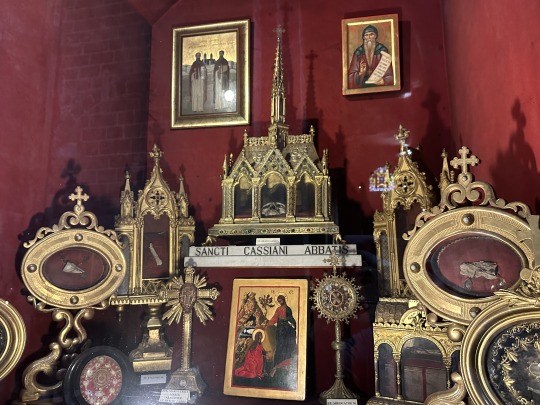
St John Cassian relics in the main Church of St Victor Abbaye in Marseille France.
Saint John Cassian lived in the West for many years, but his spiritual homeland was the Orthodox East. He fell asleep in the Lord in the year 435. His holy relics rest in an underground chapel in the Monastery of Saint Victor in Marseilles. His head and right hand are in the main church.
THE MONK LEO, CAPPADOCIAN MONASTIC

Saint Leo of Cappadocia fulfilled the commandment to love his neighbor by suggesting to the Saracens, who had captured three sickly monks, that he take the place of these infirm captives with himself, since he was healthy and able to work.
While journeying in the desert, Saint Leo weakened and was not able to go any farther. He was beheaded with the sword, thereby laying down his life for his neighbor.
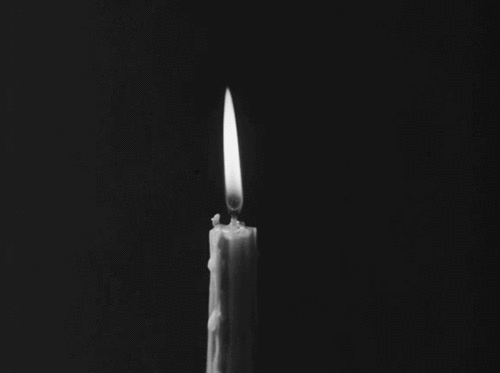
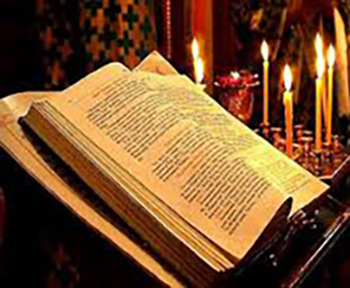
JOEL 2:12-26
12 Now, therefore, says the Lord, Turn to Me with all your heart, With fasting, with weeping, and with mourning. 13 So rend your heart, and not your garments; Return to the Lord your God, For He is gracious and merciful, Slow to anger, and of great kindness; And He relents from doing harm. 14 Who knows if He will turn and relent, And leave a blessing behind Him-- A grain offering and a drink offering For the Lord your God? 15 Blow the trumpet in Zion, Consecrate a fast, Call a sacred assembly; 16 Gather the people, Sanctify the congregation, Assemble the elders, Gather the children and nursing babes; Let the bridegroom go out from his chamber, And the bride from her dressing room. 17 Let the priests, who minister to the Lord, Weep between the porch and the altar; Let them say, "Spare Your people, O Lord, And do not give Your heritage to reproach, That the nations should rule over them. Why should they say among the peoples, 'Where is their God?' " 18 Then the Lord will be zealous for His land, And pity His people. 19 The Lord will answer and say to His people, "Behold, I will send you grain and new wine and oil, And you will be satisfied by them; I will no longer make you a reproach among the nations. 20 But I will remove far from you the northern army, And will drive him away into a barren and desolate land, With his face toward the eastern sea And his back toward the western sea; His stench will come up, And his foul odor will rise, Because he has done monstrous things. 21 Fear not, O land; Be glad and rejoice, For the Lord has done marvelous things! 22 Do not be afraid, you beasts of the field; For the open pastures are springing up, And the tree bears its fruit; The fig tree and the vine yield their strength. 23 Be glad then, you children of Zion, And rejoice in the Lord your God; For He has given you the former rain faithfully, And He will cause the rain to come down for you-- The former rain, And the latter rain in the first month. 24 The threshing floors shall be full of wheat, And the vats shall overflow with new wine and oil. 25 So I will restore to you the years that the swarming locust has eaten, The crawling locust, The consuming locust, And the chewing locust, My great army which I sent among you. You shall eat in plenty and be satisfied, And praise the name of the Lord your God, Who has dealt wondrously with you; And My people shall never be put to shame. Then you shall know that I am in the midst of Israel: I am the Lord your God And there is no other. My people shall never be put to shame. And it shall come to pass afterward That I will pour out My Spirit on all flesh; Your sons and your daughters shall prophesy, Your old men shall dream dreams, Your young men shall see visions. 26 You shall eat in plenty and be satisfied, And praise the name of the Lord your God, Who has dealt wondrously with you; And My people shall never be put to shame.
#orthodoxy#orthodoxchristianity#easternorthodoxchurch#originofchristianity#spirituality#holyscriptures#bible#saints
5 notes
·
View notes
Text
Saints&Reading: Tuesday, November 21, 2023
november 8_november 21
THE CELEBRATION OF THE SOBOR (ASSEMBLAGE) OF THE LEADER OF THE HEAVENLY HOSTS MICHAEL, AND THE OTHER HEAVENLY BODILESS POWERS

The Synaxis of the Chief of the Heavenly Hosts, Archangel Michael and the Other Heavenly Bodiless Powers: Archangels Gabriel, Raphael, Uriel, Selaphiel, Jehudiel, Barachiel, and Jeremiel was established at the beginning of the fourth century at the Council of Laodicea, which met several years before the First Ecumenical Council. The 35th Canon of the Council of Laodicea condemned and denounced as heretical the worship of angels as gods and rulers of the world, but affirmed their proper veneration.
A Feastday was established in November, the ninth month after March (with which the year began in ancient times) since there are Nine Ranks of Angels. The eighth day of the month was chosen for the Synaxis of all the Bodiless Powers of Heaven since the Day of the Dread Last Judgment is called the Eighth Day by the holy Fathers. After the end of this age (characterized by its seven days of Creation) will come the Eighth Day, and then “the Son of Man shall come in His Glory and all the holy Angels with Him” (Mt. 25:31).
The Angelic Ranks are divided into three Hierarchies: highest, middle, and lowest.
The Highest Hierarchy includes: the Seraphim, Cherubim and Thrones.
The six-winged SERAPHIM (Flaming, Fiery) (Is 6:2) stand closest of all to the Most Holy Trinity. They blaze with love for God and kindle such love in others.
The many-eyed CHERUBIM (outpouring of wisdom, enlightenment) (Gen 3:24) stand before the Lord after the Seraphim. They are radiant with the light of knowledge of God, and knowledge of the mysteries of God. Through them wisdom is poured forth, and people’s minds are enlightened so they may know God and behold His glory.
The THRONES (Col 1:16) stand after the Cherubim, mysteriously and incomprehensibly bearing God through the grace given them for their service. They are ministers of God’s justice, giving to tribunals, kings, etc. the capacity for righteous judgment.
The Middle Angelic Hierarchy consists of three Ranks: Dominions, Powers, and Authorities:
DOMINIONS (Col 1:16) hold dominion over the angels subject to them. They instruct the earthly authorities, established by God, to rule wisely, and to govern their lands well. The Dominions teach us to subdue sinful impulses, to subject the flesh to the spirit, to master our will, and to conquer temptation.
POWERS (1 Pet 3:22) fulfill the will of God without hesitation. They work great miracles and give the grace of wonderworking and clairvoyance to saints pleasing to God. The Powers assist people in fulfilling obediences. They also encourage them to be patient, and give them spiritual strength and fortitude.
AUTHORITIES (1 Pet 3:22, Col 1:16) have authority over the devil. They protect people from demonic temptations, and prevent demons from harming people as they would wish. They also uphold ascetics and guard them, helping people in the struggle with evil thoughts.
The Lowest Hierarchy includes the three Ranks: Principalities, Archangels, and Angels:
PRINCIPALITIES (Col 1:16) have command over the lower angels, instructing them in the fulfilling of God’s commands. They watch over the world and protect lands, nations and peoples. Principalities instruct people to render proper honor to those in authority, as befits their station. They teach those in authority to use their position, not for personal glory and gain, but to honor God, and to spread word of Him, for the benefit of those under them.
ARCHANGELS (1 Thess 4:16) are messengers of great and wondrous tidings. They reveal prophecies and the mysteries of the faith. They enlighten people to know and understand the will of God, they spread faith in God among the people, illuminating their minds with the light of the Holy Gospel.
ANGELS (1 Pet 3:22) are in the lowest rank of the heavenly hierarchy, and closest to people. They reveal the lesser mysteries of God and His intentions, guiding people to virtuous and holy life. They support those who remain steadfast, and they raise up the fallen. They never abandon us and they are always prepared to help us, if we desire it.
All the Ranks of the Heavenly Powers are called angels, although each has its own name and position by virtue of their service. The Lord reveals His will to the highest ranks of the angels, and they in turn inform the others.
Over all the Nine Ranks, the Lord appointed the Holy Archangel Michael (his name in Hebrew means “who is like unto God”), the faithful servitor of God, as Chief Commander. He cast down from Heaven the arrogantly proud Lucifer and the other fallen spirits when they rebelled against God. Michael summoned the ranks of angels and cried out, “Let us attend! Let us stand aright before our Creator and do not consider doing what is displeasing unto God!”
According to Church Tradition, and in the church services to the Archangel Michael, he participated in many other Old Testament events.
During the Exodus of the Israelites from Egypt he went before them in the form of a pillar of cloud by day and a pillar of fire by night. Through him the power of the Lord was made manifest, annihilating the Egyptians and Pharaoh who were in pursuit of the Israelites. The Archangel Michael defended Israel in all its misfortunes.
He appeared to Joshua Son of Navi and revealed the will of the Lord at the taking of Jericho (Josh 5:13-16). The power of the great Chief Commander of God was manifest in the annihilation of the 185,000 soldiers of the Assyrian emperor Sennacherib (4/2 Kings 19:35); also in the smiting of the impious leader Heliodorus (2 Macc. 3: 24-26); and in the protection of the Three Holy Youths: Ananias, Azarias and Misail, thrown into the fiery furnace for their refusal to worship an idol (Dan 3:22-25).
Through the will of God, the Chief Commander Michael transported the Prophet Habbakuk (December 2) from Judea to Babylon, to give food to Daniel in the lions’ den (Dan. 14:33-37).
The Archangel Michael disputed with the devil over the body of the holy Prophet Moses (Jude 1:9).
The holy Archangel Michael showed his power when he miraculously saved a young man, cast into the sea by robbers with a stone about his neck on the shores of Mt Athos. This story is found in the Athonite Paterikon, and in the Life of Saint Neophytus of Docheiariou (November 9).
From ancient times the Archangel Michael was famed for his miracles in Rus. In the Volokolamsk Paterikon is a narrative of Saint Paphnutius of Borov with an account of Tatar tax-gatherers concerning the miraculous saving of Novgorod the Great: “Therefore Great Novgorod was never taken by the Hagarenes... when... for our sins the godless Hagarene emperor Batu devoured and set the Russian land aflame and came to Novgorod, and God and the Most Holy Theotokos shielded it with an appearance of Michael the Archangel, who forbade him to enter into it. He [Batu] was come to the Lithuanian city and came toward Kiev and saw the stone church, over the doors of which the great Archangel Michael had written and spoken to the prince his allotted fate, ‘By this we have forbidden you entry into Great Novgorod’.”
Intercession for Russian cities by the Most Holy Queen of Heaven always involved Her appearances with the Heavenly Hosts, under the leadership of the Archangel Michael. Grateful Rus acclaimed the Most Pure Mother of God and the Archangel Michael in church hymns. Many monasteries, cathedrals, court and merchant churches are dedicated to the Chief Commander Michael.
In old Kiev at the time of the accepting of Christianity, a cathedral of the Archangel was built, and a monastery also was named for him. Archangel cathedrals are found at Smolensk, Nizhni Novgorod, Staritsa, at Great Ustiug (beginning of the thirteenth century), and a cathedral at Sviyazhsk. In Rus there was not a city where there was not a church or chapel dedicated to the Archangel Michael.
One of the chief temples of the city of Moscow, the burial church in the Kremlin, is dedicated to him. Numerous and beautiful icons of the Chief Commander of the Heavenly Hosts are also in his Cathedral. One of these, the Icon “Blessed Soldiery,” was painted in the Dormition Cathedral of the Moscow Kremlin. The saintly soldiers, Russian princes, are depicted under the leadership of the Archangel Michael.
We invoke Saint Michael for protection from invasion by enemies and from civil war, and for the defeat of adversaries on the field of battle. He conquers all spiritual enemies.
Holy Scripture and Tradition give us the names of the Archangels:
Gabriel: strength (power) of God, herald and servitor of Divine omnipotence (Dan 8:16, Luke 1:26). He announces the mysteries of God.
Raphael: the healing of God, the curer of human infirmities (Tobit 3:16, 12:15)
Uriel: the fire or light of God, enlightener (2 Esdras 5:20). We pray for him to enlighten those with darkened minds.
Selaphiel: the prayer of God, impelling to prayer (2 Esdras 5:15). He prays to God for mankind.
Jehudiel: the glorifying of God, encouraging exertion for the glory of the Lord and interceding for the reward of efforts.
Barachiel: distributor of the blessings of God for good deeds, entreats the mercy of God for people.
Jeremiel: the raising up to God (2 Esdras 4:36)
On icons the Archangels are depicted in according to the character of their service:
Michael tramples the devil underfoot, and in his left hand holds a green date-tree branch, and in his right hand a spear with a white banner on which is outlined a scarlet cross, or sometimes a fiery sword.
Gabriel with a branch from Paradise, presented by him to the Most Holy Virgin, or with a shining lantern in his right hand and with a mirror made of jasper in his left.
Raphael holds a vessel with healing medications in his left hand, and with his right hand leads Tobias, carrying a fish for healing (Tobit 5-8).
Uriel in his raised right hand holds a naked sword at the level of his chest, and in his lowered left hand “a fiery flame.”
Selaphiel in a prayerful posture, gazing downwards, hands folded on the chest.
Jehudiel holds a golden crown in his right hand, in his left, a whip of three red (or black) thongs.
Barachiel is shown with a white rose on his breast.
Jeremiel holds balance-scales in his hand.
Each person has a guardian angel (Matt 18:10), and every nation also receives its own guardian angel from God (Dan. 10:13). When a church is consecrated, it also receives a guardian angel (Palladius, Dial. Ch. 10).
Source: Orthodox Church in America_OCA
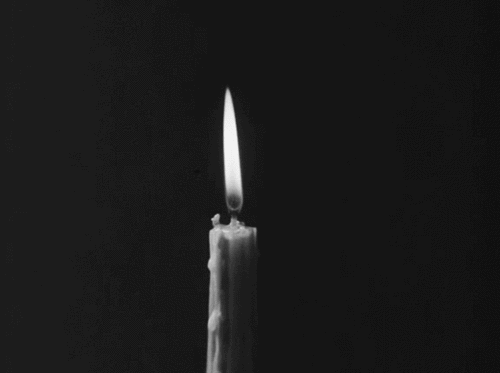
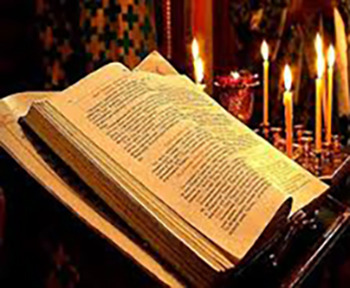
HEBREWS 2:2-10
2 For if the word spoken through angels proved steadfast, and every transgression and disobedience received a just reward, 3 how shall we escape if we neglect so great a salvation, which at the first began to be spoken by the Lord, and was confirmed to us by those who heard Him, 4 God also bearing witness both with signs and wonders, with various miracles, and gifts of the Holy Spirit, according to His own will? 5 For He has not put the world to come, of which we speak, in subjection to angels. 6 But one testified in a certain place, saying:"What is man that You are mindful of him, Or the son of man that You take care of him? 7 You have made him a little lower than the angels; You have crowned him with glory and honor, And set him over the works of Your hands. 8 You have put all things in subjection under his feet." For in that He put all in subjection under him, He left nothing that is not put under him. But now we do not yet see all things put under him. 9 But we see Jesus, who was made a little lower than the angels, for the suffering of death crowned with glory and honor, that He, by the grace of God, might taste death for everyone. 10 For it was fitting for Him, for whom are all things and by whom are all things, in bringing many sons to glory, to make the captain of their salvation perfect through sufferings.
LUKE 10:16-21
16 He who hears you hears Me, he who rejects you rejects Me, and he who rejects Me rejects Him who sent Me. 17 Then the seventy returned with joy, saying, "Lord, even the demons are subject to us in Your name." 18 And He said to them, "I saw Satan fall like lightning from heaven. 19 Behold, I give you the authority to trample on serpents and scorpions, and over all the power of the enemy, and nothing shall by any means hurt you. 20 Nevertheless do not rejoice in this, that the spirits are subject to you, but rather rejoice because your names are written in heaven. 21 In that hour Jesus rejoiced in the Spirit and said, "I thank You, Father, Lord of heaven and earth, that You have hidden these things from the wise and prudent and revealed them to babes. Even so, Father, for so it seemed good in Your sight.
#orthodoxy#orthodoxchristianity#easternorthodoxchurch#originofchristianity#spirituality#holyscriptures#gospel#bible#wisdom#archangel#archangel michael#archangel gabriel
18 notes
·
View notes
Text
Icon, Saints&Reading: Monday, November 6, 2023
october 36-november 6
ICON: JOY OF ALL WHO SORROW (1688)

How much consolation is contained in just the name of this Icon - awakening, strengthening the people's faith in the Mother of God, as a wondrous helper, who hastens everywhere where the groan of human suffering is heard, who wipes away the tears of those who mourn, and in sorrow itself, bestows moments of delight and heavenly joy. Rejoice always, O Heavenly Joy of all who Sorrow.
In accordance with the faith of the people in the loving kindness of the Mother of God toward the human race, it has been customary to depict the Theotokos in a way which conforms to what is heard in the words of the prayer: "O Most Holy Sovereign Lady Theotokos, you are higher than all the Angels and Archangels, and more honorable than all creation. You are the helper of the oppressed, the hope of the hopeless, the aid of the poor, the consolation of the grieving, the nourisher of the hungry, the clothing of the naked, the healing of the sick, the salvation of the sinful, the help and succor of all Christians."
Therefore, the Mother of God is depicted in full stature, sometimes with the Divine Child in her arms (as in the Moscow prototype), sometimes without the Child (as in the Icon with coins, which was glorified in St. Petersburg on July 23, 1888. She is surrounded by all sorts of distressed people - the naked, the offended, and the hungry. Around these poor unfortunates Angels are often depicted, sent by the Sovereign Lady to alleviate human suffering. The Angels, coming close to the people, point to the Mother of God, who is depicted on the "Joy of All Who Sorrow" Icons, either in glory, with a crown on her head and in royal vesture, or in the usual garments of her earthly sojourn, and in a white cloth on her head.
In Moscow, in the XVII century, a certain Icon of the Mother of God of this name became famous. The first miracle occurred in 1688 for the ailing Euphemia, the sister of Patriarch Joachim, who lived on Ordynka. She experienced terrible suffering from a wound in her side. This wound was so great that her intestines were visible. The patient was waiting for death, but at the same time, she did not lose hope in Divine help. One day, after asking to partake of the Holy Mysteries, she began to cry out to the Most Holy Theotokos with great faith: "Hear me, All-Merciful Sovereign Lady! The entire world boasts of you, and all receive your abundant mercies. I deserve to be punished for my iniquities, but do not punish me in your wrath. Behold my harsh infirmity, and have mercy on me."
After this prayer, the patient heard a voice: "Euphemia, in your suffering, why do you not resort to the universal Healer of all?"
Astonished by the voice Euphemia replied, "Where may I find such a Healer?"
The answer came: "There is an image of me in the church of my Son's Transfiguration, called "Joy of all who Sorrow." It stands on the left side in the trapeza, where the women usually stand. Summon the priest from that church to come to your house with the Icon, and when he has served a Moleben with the Sanctification of Water, you shall receive healing. Do not forget my mercy toward you, and proclaim it for the glorification of my name."
When Euphemia recovered from the excitement of this vision, she learned from her relatives that in the church of the Transfiguration, on Ordynka, there really was a "Joy of All Who Sorrow" Icon of the Mother of God, so she summoned the priest to come to her house with the Icon. After serving a Moleben with the Sanctification of Water, Euphemia was healed on October 24, 1688. Later, a Feast was established in honor of this Icon in remembrance of her healing which took place on this day.
Some think that the original "Joy of All Who Sorrow" Icon of the Mother of God was brought to St. Petersburg, to Princess Natalia Alekseevna, and that it is precisely the image that stands in the Sorrowful Church, on Shpalerna. However, it is more probable that the original Icon remained in Moscow.
MARTYRS ARETHA AND 3299 MARTYRS WITH HIM (523)

The Martyr Arethas and with him 4299 Martyrs suffered for the Lord Jesus Christ in the sixth century. Arethas was prefect of the Christian city of Negran in Arabia. The Arabian (or Omirite) king, Dunaan, who was Jewish, decided to eliminate Christianity from the land. He issued an edict that all followers of Christ were to be put to death.
Because the inhabitants of Negran remained faithful to the Lord, Dunaan came with a large army to destroy the city. At the city walls of Negran the king’s heralds announced that Dunaan would only spare those who renounced Christ and referred to His Cross as a “sign of malediction.”
Not daring to assault the Christian city by force, Dunaan resorted to a ruse. Dunaan swore an oath that he would not force the Christians into Judaism, but would merely collect a tribute from Negran. The inhabitants of the city would not heed the advice of Saint Arethas, and putting their trust in Dunaan, they opened the city gates.
The very next day Dunaan gave orders to light an immense fire and throw all the clergy of the city into it in order to frighten the rest of the Christians. 427 men were burned. He also threw the prefect Arethas and the other chief men into prison. Then the oppressor sent his messengers through the city to convert the Christians to Judaism. Dunaan himself conversed with those inhabitants brought from the prisons, saying, “I do not demand that you should renounce the God of heaven and earth, nor do I want you to worship idols, I want merely that you do not believe in Jesus Christ, since the Crucified One was a man, and not God.”
The holy martyrs replied that Jesus is God the Word, the Second Person of the Holy Trinity, Who for the salvation of mankind was incarnate of the Holy Spirit and the Virgin Mary. Those suffering said, “We shall not abjure Christ, since He is Life for us. To die for Him is to find Life.”
More than four thousand Christians, men, women, both the aged and children, from the city of Negran and surrounding villages suffered martyrdom for Christ.
Source: Orthodox Church in America_OCA

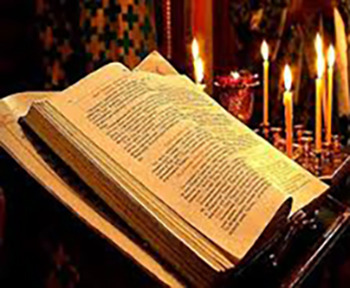
1 THESSALONIANS 1:1-5
1 Paul, Silvanus, and Timothy, To the church of the Thessalonians in God the Father and the Lord Jesus Christ: Grace to you and peace from God our Father and the Lord Jesus Christ. 2 We give thanks to God always for you all, making mention of you in our prayers, 3 remembering without ceasing your work of faith, labor of love, and patience of hope in our Lord Jesus Christ in the sight of our God and Father, 4 knowing, beloved brethren, your election by God. 5 For our gospel did not come to you in word only, but also in power, and in the Holy Spirit and in much assurance, as you know what kind of men we were among you for your sake.
LUKE 10:22-24
22 All things have been delivered to Me by My Father, and no one knows who the Son is except the Father, and who the Father is except the Son, and the one to whom the Son wills to reveal Him. 23 Then He turned to His disciples and said privately, "Blessed are the eyes which see the things you see; 24 for I tell you that many prophets and kings have desired to see what you see, and have not seen it, and to hear what you hear, and have not heard it.
#orthodoxy#orthodoxchristianity#easternorthodoxchurch#originofchristianity#spirituality#holyscriptures#gospel#bible#wisdom#saint#icon#sacredart#wonderworking
10 notes
·
View notes
Text
Saints&Reading: Saturday, October 21, 2023
october 8_october 21
VENERABLE PELAGIA (457) THE PENITENT OF THE Mt OF OLIVES

Saint Pelagia the Penitent was converted to Christianity by Saint Nonnus, Bishop of Edessa (Saturday of Cheesefare Week). Before her acceptance of Christianity through Baptism, Pelagia was head of a dance troupe in Palestinian Antioch, living a life of frivolity and prostitution.
On the following day, when Saint Nonnus was teaching in the church about the dread Last Judgment and its consequences, Pelagia came. The teaching made a tremendous impression upon her. With the fear of God and weeping tears of repentance, she asked the saint for Baptism. Seeing her sincere and full repentance, Bishop Nonnus baptized her.
By night the devil appeared to Pelagia, urging her to return to her former life. The saint prayed, signed herself with the Sign of the Cross, and the devil vanished.
Three days after her baptism, Saint Pelagia gathered up her valuables and took them to Bishop Nonnus. The bishop ordered that they be distributed among the poor saying, “Let this be wisely dispersed, so that these riches gained by sin may become a wealth of righteousness.” After this Saint Pelagia journeyed to Jerusalem to the Mount of Olives. She lived there in a cell, disguised as the monk Pelagius, living in ascetic seclusion, and attaining great spiritual gifts. When she died, she was buried in her cell.
Source: Orthodox Church in America_OCA
NEW MONK-MARTYR IGNATIUS of BULGARIA and Mt ATHOS (1814).

The holy New Martyr Ignatius was born in the village of Eski Zagora in the Trnovo region of Bulgaria, and was named John in Baptism. While he was still a young child, his parents George and Maria moved to the city of Philippopolis and enrolled him in a school there.
Although he did well at school, he had a strong desire for the monastic life. Upon reaching adulthood, he entered the Rila monastery in western Bulgaria. There he was assigned to an Elder, with whom he lived in obedience for six years. When the Elder’s strictness became unbearable, John returned home.
About that time the Serbs rose in revolt against the Moslem government. John’s father was asked to take command of an Ottoman brigade, but he refused to fight against other Orthodox Christians.
The Moslems attacked George with furious anger. He was stabbed and then beheaded. John’s mother and sisters were also taken by the Hagarenes, and they ultimately agreed to convert to Islam.
John fled and hid in the home of an elderly Orthodox woman. His mother and sisters learned where he was hiding, and they told the Moslems. Those sent to capture him did not know what he looked like, so the old woman told them she did not know him. The woman helped him escape to Bucharest, Romania, where he became acquainted with Saint Euthymius, who would also endure martyrdom.
John did not wish to stay in Bucharest, however, and so he left for Mt. Athos. On the way he visited the village of Soumla, where he ran into his friend Father Euthymius again. Learning that Euthymius had denied Christ and beome a Moslem, John became very sad and left the village.
He had not gotten very far when Turkish soldiers stopped him and took all his possessions. They demanded that he convert to Islam, and in his fright he told them that he would do so. Satisfied with this reply, they let him go.
John reached the village of Eski Zagora, where he met an Athonite monk from the monastery of Grigoriou. They journeyed to the Holy Mountain together, and John settled in the Skete of Saint Anna. There he met Father Basil.
One day John and Father Basil traveled to Thessalonica on monastery business. While they were there the monks David and Euthymius of Demetsana suffered martyrdom because they were Christians. John was inflamed with the desire for martyrdom. Father Basil, however, urged him to postpone his intention, and so they returned to the Holy Mountain. A short time after this, Father Basil died.
When a monk from the Skete of Saint Anna told him of the martyrdom of the New Martyr Euthymius (March 22), John was once more filled with zeal for martyrdom. He was placed under the spiritual direction of the Elder Acacius, who prescribed for him prayer, prostrations, and reading the Gospel.
In time, John was found worthy of monastic tonsure, and was given the new name Ignatius. The Elder Acacius blessed him to travel to Constantinople with the monk Gregory in order to bear witness to Christ. After receiving the Holy Mysteries in Constantinople, Ignatius felt he was ready for his ordeal.
Dressed in Moslem garb, Ignatius went before the kadi and proclaimed his faith in Christ. He told him how he had promised to become a Moslem when he was younger, but now he threw his turban at the kadi’s feet and said that he would never deny Christ.
Thinking that Ignatius was insane, the kadi warned him that if he did not come to his senses he would endure horrible torments before being put to death. On the other hand, if he embraced Islam, he would receive rich gifts and great honor from them.
The courageous martyr told the kadi to keep his gifts, for they were merely temporal gifts. “Your threats of torture and death are nothing new,” he said, “and I knew of them before I came here. In fact, I came here because of them, so that I might die for my Christ.”
Saint Ignatius went on to call Mohammed “a false prophet, a teacher of perdition, and a friend of the devil.” Then he invited the Moslems to believe in Christ, the only true God.
The kadi then became so angry he could not speak, so he motioned for a servant to lead Saint Ignatius out of the room. Ignatius turned and struck the servant, then knelt before the kadi and bent his neck, as if inviting him to behead him then and there. Other servants entered the room, however, and dragged him off to prison.
Later, Ignatius was brought before the kadi for questioning. When asked who had brought him to Constantinople, he replied, “My Lord Jesus Christ brought me here.”
Again the kadi urged him to reconsider, for he was about to experience unimaginable tortures. “Do not expect to be beheaded so that the Christians can collect your blood as a blessing,” he said, “for I intend to hang you.”
Ignatius replied, “You will be doing me a great service whether you hang me or put me to the sword. I accept everything for the love of Christ.”
Seeing that he could not turn Ignatius from his Christian Faith, the kadi ordered him to be hanged. He was taken to a place called Daktyloporta, where the sentence was carried out. The martyr’s body remained hanging there for three days, then some pious Christians paid a ransom for it and took it to the island of Prote for burial.
Saint Ignatius gave his life for Christ on October 8, 1814. He is also commemorated on May 1 with Saints Acacius and Euthymius.
The head of Saint Ignatius is in the Monastery of Saint Panteleimon on Mt Athos.
Source: Orthodox Church in America_OCA
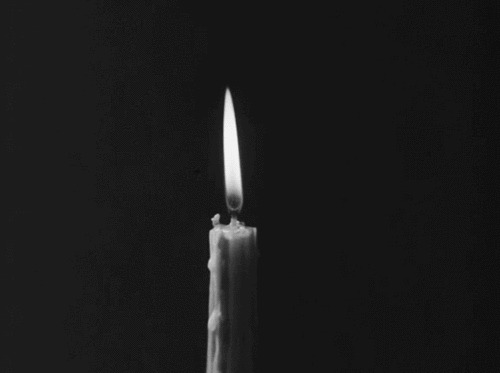
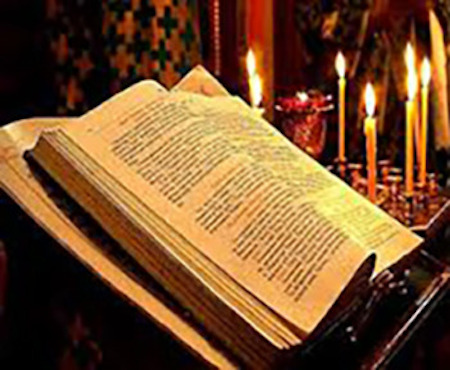
2 CORINTHIANS 1:8-11
8 For we do not want you to be ignorant, brethren, of our trouble which came to us in Asia: that we were burdened beyond measure, above strength, so that we despaired even of life. 9 Yes, we had the sentence of death in ourselves, that we should not trust in ourselves but in God who raises the dead, 10 who delivered us from so great a death, and does deliver us; in whom we trust that He will still deliver us, 11 you also helping together in prayer for us, that thanks may be given by many persons on our behalf for the gift granted to us through many.
LUKE 5:27-32
27 After these things He went out and saw a tax collector named Levi, sitting at the tax office. And He said to him, "Follow Me." 28 So he left all, rose up, and followed Him. 29 Then Levi gave Him a great feast in his own house. And there were a great number of tax collectors and others who sat down with them. 30 And their scribes and the Pharisees complained against His disciples, saying, "Why do You eat and drink with tax collectors and sinners?" 31 Jesus answered and said to them, "Those who are well have no need of a physician, but those who are sick. 32 I have not come to call the righteous, but sinners, to repentance
#orthodoxy#orthodoxchristianity#easternorthodoxchurch#originofchristianity#spirituality#holyscriptures#bible#gospel#wisdom
11 notes
·
View notes
Text
Saints&Reading: Sunday, December 24, 2023
december 11_december 24
Week of Holy Forefathers:

The Sunday that falls between December 11-17 is known as the Sunday of the Holy Forefathers. These are the ancestors of Christ according to the flesh, who lived before the Law and under the Law, especially the Patriarch Abraham, to whom God said, “In thy seed shall all of the nations of the earth be blessed” (Gen. 12:3, 22:18).
VENERABLE DANIEL THE STYLITE OF CONSTANTINOPLE (490)
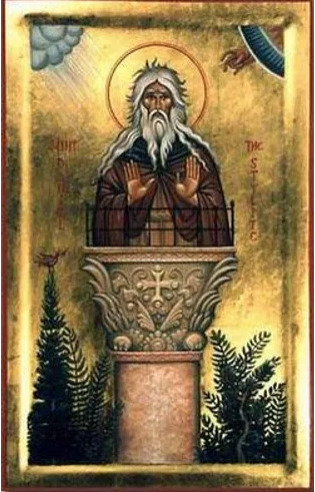
Saint Daniel the Stylite was born in the village of Bethara, near the city of Samosata in Mesopotamia. His mother Martha was childless for a long while and in her prayers she vowed that if she had a child, she would dedicate him to the Lord. Her prayers were heard, and Martha soon gave birth to a son, who was without a name until he was five years of age.
The boy’s parents desired that since he was born through the good-will of God, he should also receive his name from God. They took their son to a monastery located nearby and approached the igumen. The igumen gave orders to take down one of the service books, and unrolled it at random. He found the Prophet Daniel (December 17) mentioned in it. Thus did the boy receive his name. The parents asked that he might remain at the monastery, but the igumen would not accept him, since he was still only a small boy. At twelve years of age, saying nothing to anyone, the child left home for the monastery.
His parents were happy when they learned where their son was, and they went to the monastery. Seeing that he was still going about in his worldly clothes, they besought that the igumen should clothe him in the angelic garb. That Sunday the igumen fulfilled their request, but permitted them often to visit their son. The brethren of the monastery were astonished at the saint’s ascetical efforts.
Once, Saint Simeon the Stylite (September 1) visited the monastery. He foretold to the young monk that he too would undertake the feat of pillar-dwelling. Saint Daniel continued with his ascetic life in seclusion. When the place of a new exploit was revealed to him in a vision, he withdrew into the Thracian wilderness together with two disciples. They set up a pillar, upon which Saint Daniel dwelt for 33 years. People thronged to the pillar, the unfortunate and those who were sick, and all received help and healing from Saint Daniel. Byzantine emperors also sought the prayers of the holy ascetic. The most notable of the saint’s predictions was about a great fire in Constantinople. Saint Daniel possessed also the gift of gracious words. He guided many onto the path of correcting their lives. The monk reposed in his eightieth year.
Source: Orthodox Church in America_OCA
St NICON THE DRY OF THE KIEV NEAR CAVE( 1101)
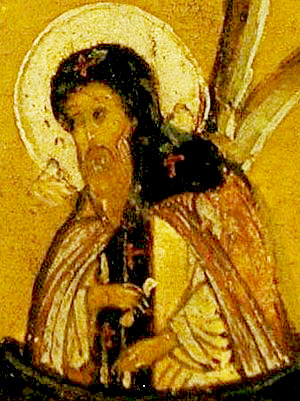
Saint Nikon the Dry, the son of rich and illustrious parents, gave up everything for Christ and became a monk at the Kiev Caves monastery. In the year 1096, during the incursions of Khan Bonyak, he was taken into captivity with some other monks. The captors treated Saint Nikon harshly, while waiting for a ransom to be paid. When the saint refused to be ransomed, his masters began to torment him with hunger, and left him exposed in the heat of summer and the cold of winter. He was mistreated and beaten every day for about three years, for his captors thought he would change his mind and send word to his relatives, asking to be ransomed.
The saint gave thanks to God for everything, and once said to his tormentor that the Lord, through the prayers of Saints Anthony and Theodosius would return him to his monastery within three days, as Saint Eustratius (March 28) had predicted while appearing to him.
The captor cut the tendons in Saint Nikon’s legs and set a strong guard over him. But suddenly, on the third day at the sixth hour, the holy captive became invisible. At the moment the guard heard the words, “Praise the Lord from the Heavens” (Ps. 148).
Saint Nikon was transported to the Dormition church, where the Divine Liturgy was being served. The brethren surrounded him and began to ask how he got there. Saint Nikon wanted to conceal the miracle, but the brethren implored him to tell the truth.
Saint Nikon did not want to have his fetters removed, but the igumen said, “If the Lord had wanted you to remain fettered, He would not have delivered you from captivity.”
After a long while Saint Nikon’s former master came to the Kiev Caves monastery and recognized his former captive, who was withered from hunger and the loss of blood from his wounds. He came to believe in Christ, and accepted Baptism. After receiving monastic tonsure, he became a novice under Saint Nikon’s direction.
Saint Nikon died at the beginning of the twelfth century and was buried in the Near Caves. Though he did not enjoy good health in this life, his holy relics were glorified by incorruption. His memory is celebrated also on September 28 and on the second Sunday of Great Lent.
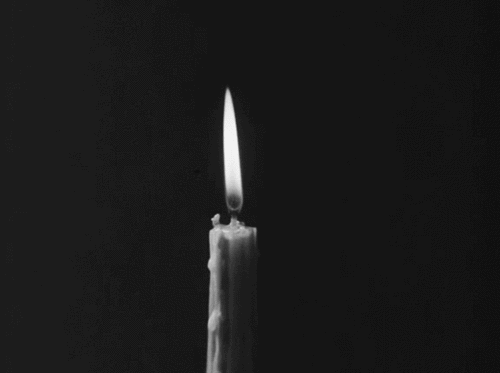
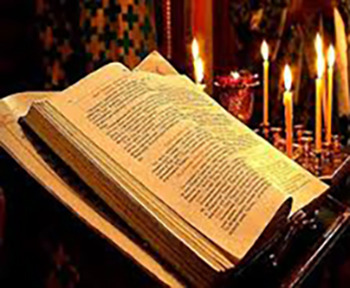
COLOSSIANS 3:4-11
4 When Christ who is our life appears, then you also will appear with Him in glory. 5 Therefore put to death your members which are on the earth: fornication, uncleanness, passion, evil desire, and covetousness, which is idolatry. 6 Because of these things the wrath of God is coming upon the sons of disobedience, 7 in which you yourselves once walked when you lived in them. 8 But now you yourselves are to put off all these: anger, wrath, malice, blasphemy, filthy language out of your mouth. 9 Do not lie to one another, since you have put off the old man with his deeds, 10 and have put on the new man who is renewed in knowledge according to the image of Him who created him, 11 where there is neither Greek nor Jew, circumcised nor uncircumcised, barbarian, Scythian, slave nor free, but Christ is all and in all.
LUKE 14:16-24
16 Then He said to him, "A certain man gave a great supper and invited many, 17 and sent his servant at supper time to say to those who were invited, 'Come, for all things are now ready.' 18 But they all with one accord began to make excuses. The first said to him, 'I have bought a piece of ground, and I must go and see it. I ask you to have me excused.' 19 And another said, 'I have bought five yoke of oxen, and I am going to test them. I ask you to have me excused.' 20 Still another said, 'I have married a wife, and therefore I cannot come.' 21 So that servant came and reported these things to his master. Then the master of the house, being angry, said to his servant, 'Go out quickly into the streets and lanes of the city, and bring in here the poor and the maimed and the lame and the blind.' 22 And the servant said, 'Master, it is done as you commanded, and still there is room.' 23 Then the master said to the servant, 'Go out into the highways and hedges, and compel them to come in, that my house may be filled. 24 'For I say to you that none of those men who were invited shall taste my supper.' "
Commentary of the Church's Father:
Theophylact of Ochrid AD 1107 : Because the man who sat at table with Him had said, Blessed is he that shall eat bread in the kingdom of God, the Lord teaches him at some length what it means to feast with God, and tells this parable. By a certain man the Lord means His Father, the Lover of man. Whenever Scripture alludes to God's power to punish, He is called a panther, a leopard, or a bear [Hos. 13:7-8].
But whenever it alludes to God's love for man, He is presented as a man, as is the case here. Since the parable treats of God's extreme love for man and the divine economy of the Incarnation which He worked in us, making us sharers of the Flesh of His Son, the parable calls God a man and this divine economy a great supper. It is a supper because the Lord came in the last days, as it were at the evening of this age. And this supper is great because great indeed, we confess, is the mystery of our salvation. [I Tim. 3:16]
And he sent his servant at supper time. Who is this servant? The Son of God, Who assumed the form a servant and became man, and as a man is said to have been sent forth. Notice how He did not say "a servant," but instead, using the definite article, the servant [of his.] Christ is the One and only Servant Who in His human nature was perfectly obedient and pleasing to God. For Christ is pleasing to the Father not only as Son and God, but also as Man. He is the only Sinless One Who carried out all the counsels and commandments of the Father and fulfilled all righteousness, and in this sense is said to serve God the Father. He alone can be called the true Servant of God. He was sent at supper time, that is, at the appointed and proper time.
For there was no other time more opportune for our salvation than the reign of Caesar Augustus, when iniquity had reached its peak and it was critical that it be cleansed. Just as physicians allow a festering and malignant boil to burst and release all its foul pus, and only then apply the medication, so too it was necessary that sin first display all its forms, and then the Great Physician applied His medicine. For this very reason the Lord waited for the devil to fill the full measure of iniquity, and then the Son of God took flesh and healed every form of iniquity by every aspect of His holy life. Therefore He was sent at that hour, that is, at that comely and opportune season of which David says, Gird Thy sword upon Thy thigh, 0 Mighty One, in Thy comeliness. (2)
Certainly the sword here signifies the Word of God [Heb. 4:12], while the words upon Thy thigh indicate His Nativity in the flesh which was in comeliness, that is, when the time was right and seemly. He was sent to speak to those who had been called. Who are those that were called? Perhaps this refers to all men. For God has called all to the knowledge of Him, by means of the order and harmony of visible creation, and by means of the natural law. But those that were called are also, more specifically, the children of Israel, who were called through the law and the prophets. In the first place, then, the Lord was sent to the sheep of the house of Israel. [Mt. 15:24] The Lord was saying to all the Jews, Come, for all things are now ready, when He proclaimed the good tidings that the kingdom of heaven is at hand [Mt. 4:17], and among you [Lk. 17:21].
And they all with one accord began to make excuse, that is, as if at a signal. For all the leaders of the Jews refused to have Jesus as their King, and thus were found unworthy of the supper, one because of his love of wealth, and another because of his love of pleasure. The man who bought a piece of ground and the man who bought the five yoke of oxen signify those who love wealth, while the man who married a wife signifies those who love pleasure. Furthermore, the man who bought a piece of ground signifies the man who cannot accept the mystery of faith because he is governed by the wisdom of this world. The piece of ground represents the world and, in general, nature, and the man who must go and see his piece of ground is he who sees only nature, and cannot accept what is beyond nature.
Therefore the Pharisee, for example, "sees his piece of ground," that is, he looks only at the laws of nature and cannot accept that a Virgin gave birth to God, because that is beyond nature. Because they are examining this "piece of ground," that is, nature, none of those who boast in external wisdom have recognized Jesus Who made nature new. The man who bought five yoke of oxen, and tested them, also represents a man who loves the material world. He has yoked the five senses of the soul to the five senses of the body and has made the soul into flesh. For this reason he is concerned only with the earth and does not desire to commune of the rational Supper, for as Wisdom says, How can he get wisdom that holdeth the plough? [Eccles. (Wis. of Sirach) 38:25]
He who stays behind because of a wife is a lover of pleasure who has devoted himself to the flesh, the mate of the soul. By cleaving to the flesh he cannot please God. You may also understand these things literally. We also fall away from God because of fields, because of yokes of oxen, because of marriages, when we become so attached to them that they consume our whole life and we are carried away even to the point of shedding blood over them. Then there is no divine thought or word that we can practice, or even comprehend
#orthodoxy#orthodoxchristianity#easternorthodoxchurch#originofchristianity#spirituality#holyscriptures#gospel#bible#wisdom#saints
7 notes
·
View notes
Text
Saints&Reading: Saturday, March 23, 2024
march 10_march 23
THE HOLY MARTYR THEODORE OF TYRE (306)
(movable feast on Saturday of the 1st week of the Great Lent).

The Holy Great Martyr Theodore the Recruit1 was a soldier in the city of Amáseia in Pontus (Asia Minor) on the coast of the Euxine (Black) Sea, under the command of the Praepositus (regimental commander) Brincus. Saint Theodore was ordered to offer sacrifice to idols, but he proclaimed his faith in Christ the Savior in a loud voice. Brincus gave him a few days to think it over, during which time the Saint prayed.
Theodore was accused of setting a pagan temple on fire and destroying the idol of Rhea, and so he was thrown into prison to be starved to death. The Lord Jesus Christ appeared to him there, comforting and encouraging him. When he was brought before the Governor Publius, Theodore boldly confessed his faith, for which he was subjected to new torments and condemned to be burnt alive. The Great Martyr Theodore mounted an enormous pyre, and after he made the Sign of the Cross, the wood was lit, but the Holy Spirit cooled the flames. Saint Theodore stood in the flames, praising and glorifying God. Then he gave his holy soul into God's hands, and the onlookers saw his soul ascending to Heaven, according to the author of his Life, who was also an eyewitness.
This occurred in about the year 306 under the Roman Emperor Galerius (305-311). Unharmed by the fire, Saint Theodore's body was buried under a widow's house in the city of Eukháϊta, not far from Amáseia. Later, his relics were transferred to Constantinople, to the church which bears his name. His head is in the city of Gaeto, Italy.
Fifty years after the Saint Theodore's martyrdom, Emperor Julian the Apostate (reigned 361-363), planned to commit an outrage upon the Christians during the first week of Great Lent. He ordered the city magistrate of Constantinople to sprinkle all the food in the marketplaces with blood which had been offered to idols. Saint Theodore appeared to Archbishop Eudoxios in a dream, and told him to inform all the Christians that no one should buy anything in the marketplaces, but to eat boiled wheat with honey (kolyva) instead.
In remembrance of this occurrence, the Orthodox Church commemorates the holy Great Martyr Theodore the Recruit each year on the first Saturday of Great Lent. On Friday evening, at the Divine Liturgy of the Presanctified Gifts, after the prayer at the Ambo, the Canon to the Holy Great Martyr Theodore, composed by Saint John of Damascus, is sung. After this, kolyva is blessed and distributed to the faithful. The celebration of the Great Martyr Theodore on the first Saturday of Great Lent was established by Patriarch Nektarios of Constantinople (381-397).
The Troparion to Saint Theodore is very similar to the Troparion for the Prophet Daniel and the Three Holy Youths (on the Sunday Before the Nativity of the Lord). The Kontakion to Saint Theodore, who suffered martyrdom by fire, reminds us that he also had faith as his breastplate (see I Thessalonians 5:8).
In iconography, Saint Theodore the Recruit is depicted in four different ways: either alone in military garb, battling a large snake, or together with Saint Theodore the Commander, standing upright or riding horses. He always wears his military uniform.
We pray to Saint Theodore the Recruit for the recovery of stolen articles.

VENERABLE ANASTASIA, NUN THE PATRICIAN OF CONSTANTINOPLE (567)

Saint Anastasia the Patrician of Alexandria lived in Constantinople and was descended from an aristocratic family. She was an image of virtue and enjoyed the great esteem of the emperor Justinian (527-565). Widowed at a young age, Anastasia decided to leave the world and save her soul far from the bustle of the capital. She secretly left Constantinople and went to Alexandria. She founded a small monastery not far from the city and devoted herself entirely to God.
Several years later, the emperor Justinian was widowed and decided to search for Anastasia and marry her. As soon as she learned of this, Saint Anastasia journeyed to a remote skete to ask Abba Daniel (March 18) for help.
In order to safeguard Anastasia, the Elder dressed her in a man’s monastic garb and called her the eunuch Anastasius. Having settled her in one of the very remote caves, the Elder gave her a Rule of prayer and ordered her never to leave the cave and to receive no one. Only one monk knew of this place. His obedience was to bring a small portion of bread and a pitcher of water to the cave once a week, leaving it at the entrance. The nun Anastasia dwelt in seclusion for twenty-eight years. Everyone believed that it was the eunuch Anastasius who lived in the cave.
The Lord revealed to her the day of her death. Having learned of her approaching death, she wrote several words for Abba Daniel on a potsherd and placed it at the entrance to the cave. The Elder came quickly and brought everything necessary for her burial. He found the holy ascetic still alive, and he confessed and communed her with the Holy Mysteries. At Abba Daniel’s request, Saint Anastasia blessed him and the monk accompanying him. With the words: “Lord, into Thy hands I commend my spirit,” the saint died in peace (ca. 567-568).
When the grave was prepared, the Elder gave his disciple his outer garment and ordered him to dress the deceased “brother” in it. As he was putting on the rassa, the monk noticed that she was a woman, but he did not dare to say anything. However, when they returned to the monastery after they buried the nun, the disciple asked Abba Daniel whether he knew the “brother” was a woman, and the Elder related to the young monk the life of Saint Anastasia. Later, the abba’s narrative was written down and received wide acclaim.
The relics of Saint Anastasia were transferred to Constantinople in 1200 and placed not far from the church of Hagia Sophia.
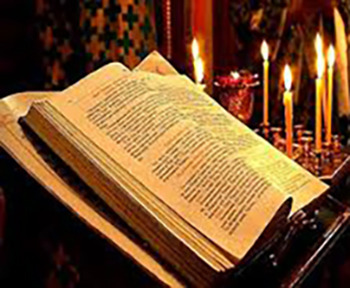
HEBREWS 1:1-12
1 God, who at various times and in various ways spoke in time past to the fathers by the prophets, 2 has in these last days spoken to us by His Son, whom He has appointed heir of all things, through whom also He made the worlds; 3 who being the brightness of His glory and the express image of His person, and upholding all things by the word of His power, when He had by Himself purged our sins, sat down at the right hand of the Majesty on high, 4 having become so much better than the angels, as He has by inheritance obtained a more excellent name than they. 5 To which of the angels did He ever say: "You are My Son, Today I have begotten You"? And again: "I will be to Him a Father, And He shall be to Me a Son"? 6 But when He brings the firstborn into the world, He says: "Let all the angels of God worship Him." 7 And of the angels He says: "Who makes His angels spirits And His ministers a flame of fire." 8 But to the Son He says: "Your throne, O God, is forever and ever; A scepter of righteousness is the scepter of Your kingdom. 9 You have loved righteousness and hated lawlessness; Therefore God, Your God, has anointed You With the oil of gladness more than Your companions." 10 And: "You, LORD, in the beginning laid the foundation of the earth, And the heavens are the work of Your hands. 11 They will perish, but You remain; And they will all grow old like a garment; 12 Like a cloak You will fold them up, And they will be changed. But You are the same, And Your years will not fail."
JOHN 15:17-16:2
17 These things I command you, that you love one another. 18 If the world hates you, you know that it hated Me before it hated you. 19 If you were of the world, the world would love its own. Yet because you are not of the world, but I chose you out of the world, therefore the world hates you. 20 Remember what I said to you, 'A servant is not greater than his master.' If they persecuted Me, they will also persecute you. If they kept My word, they will keep yours also. 21 But all these things they will do to you for My name's sake, because they do not know Him who sent Me. 22 If I had not come and spoken to them, they would have no sin, but now they have no excuse for their sin. 23 He who hates Me hates My Father also. 24 If I had not done among them the works which no one else did, they would have no sin; but now they have seen and also hated both Me and My Father. 25 But this happened that the word might be fulfilled in their law, 'They hated Me without a cause.' 26 But when the Helper comes, whom I shall send to you from the Father, the Spirit of truth who proceeds from the Father, He will testify of Me. 27 And you also will bear witness, because you have been with Me from the beginning.
1 These things I have spoken to you, that you should not be made to stumble. 2 They will put you out of the synagogues; yes, the time is coming that whoever kills you will think that he offers God service.
#orthodoxy#orthodoxchristianity#easternorthodoxchurch#originofchristianity#spirituality#holyscriptures#gospel#bible#wisdom#saints
4 notes
·
View notes
Text
Saints &reading: Sunday, December 17, 2023
december 4_december 17
THE HOLY GREATMARTYR BARBARA (306)
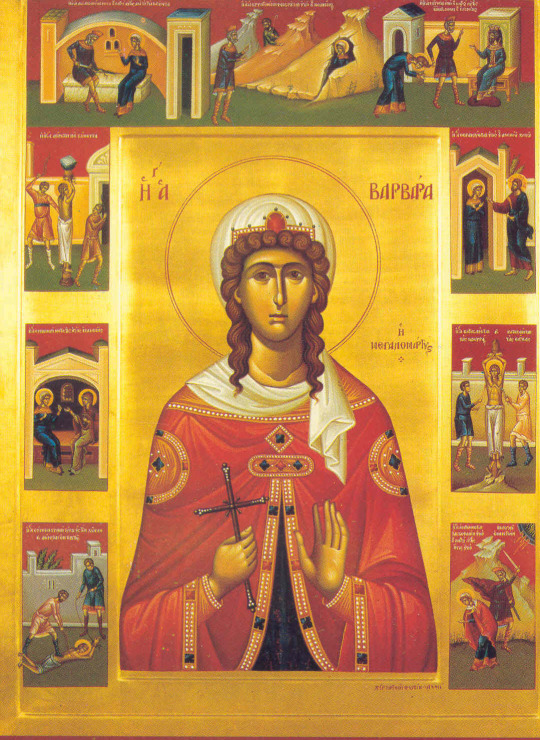
The Holy Great-martyr Barbara lived and suffered during the reign of Emperor Maximian (305-311). Her father, a pagan named Dioscoros, was an eminent, wealthy man who lived in the town of Heliopolis in Phoenicia. Widowed early in life, he focused all of his devotion upon his only daughter. Seeing Barbara’s extraordinary beauty, Dioscoros decided to raise her out of the sight of others. To this end, he erected a tower in which only Barbara and her pagan teachers dwelt. Below the tower was spread out the length and breadth of God’s world. During the day, one could view the wooded hills, the fast-flowing rivers, and the plains, carpeted with flowers. At night, a great sea of lights presented sights of inexpressible beauty. Soon the maiden began to ask herself about the Creator and the reason behind such a harmonious and marvelous world. Gradually, she came to the firm conclusion that the lifeless idols which her father and her teachers worshipped were works of human hands, incapable of having so wisely and marvelously ordered the world around her. The desire to know the Truth of God so gripped Barbara’s soul that she decided to devote her life to it, and to spend her life in virginity.
Her beauty gained renown throughout the city, and many sought her hand. However, despite her father’s loving entreaties, she refused to marry. Barbara warned her father that his insistence might result in tragedy, separating them forever. Dioscoros decided that life in isolation had affected his daughter’s character. He allowed her to leave the tower, and allowed her total freedom in choosing her friends and acquaintances. In the city, the maiden met young confessors of the Christian Faith who taught her about the Divine Logos, Creator of the world. Some time later, by God’s Providence, a priest disguised as a merchant came to Heliopolis. He performed the rite of Holy Baptism over Barbara.
At that time, Dioscoros was having a large bathhouse built at his home. He left instructions that two windows be installed on the South side. However, in her father’s absence, Barbara arranged to have the workers install a third window, to create an image of the Triune Light. Over the entrance to the bathhouse, where Barbara described the outline of a Cross, the image became firmly impressed on the stone. A spring burst forth from the place where her footprints had landed on the steps of the bathhouse. Later it manifested great healing powers.
In his account of the holy martyr’s sufferings, Symeon Metaphrastes compared the spring to the life-giving power of the Jordan and the pool of Siloam. When Dioscoros returned and expressed dissatisfaction with the alterations made to the plan of construction, his daughter related to him her coming to know the Triune God, the salvific power of the Son of God, and the futility of idol worship. Dioscoros became angry, and unsheathed his sword to strike her. The maiden ran from her father, and he followed in pursuit. A fissure in a mountain along the way opened to hide the saint. At its other end, an opening led upward. St. Barbara managed to hide in a cave on the other side of the mountain. After a long and fruitless search for his daughter, Dioscoros saw two shepherds on the mountainside. One of them showed him the cave in which the saint had hidden herself. Dioscoros cruelly beat his daughter, locked her up under guard, and for a long time tortured her with hunger. Finally, he handed her over to Markianos, governor of the city. St. Barbara was cruelly tortured. They flogged her with rawhide whips, and abraded her wounds with a coarse hair cloth. At night, the Lord Himself visited the fervently praying saint in prison, and tended to her wounds. Later, the saint was subjected to new, even more cruel trials.
Juliana, a resident of Heliopolis and a Christian, was standing in the crowd near the place of the saint’s torture. Witnessing the beautiful and renowned maiden’s voluntary martyrdom, her heart overflowed with compassion. Wanting to suffer for Christ as well, she began to loudly denounce the torturers. She was taken. The holy martyrs were subjected to lengthy trials: Their flesh was ripped with iron hooks, their breasts were severed, and they were led naked throughout the city, to be subjected to ridicule and beatings. Heeding St. Barbara’s prayers, the Lord sent an angel, who covered the naked saints with glistening garments. Resolute confessors of the Christian Faith, Sts. Barbara and Juliana were beheaded. Dioscoros himself put Barbara to death. God’s retribution fell quickly upon Markianos and Dioscoros; both were consumed by lightning.
In the 6th Century, the relics of the Saint were translated to Constantinople. In the 12th Century, Princess Barbara, daughter of the Byzantine Emperor Alexis Comnenos (1081-1118) married the Russian Prince Michael Izyaslavitch, and brought the relics with her to Kiev. They rest in the Cathedral of St. Vladimir to this day.
Source: Russion Orthodox Cathedral of St John the baptist
St JOHN DAMASCENE (760)

Saint John of Damascus was born about the year 680 at Damascus, Syria into a Christian family. His father, Sergius Mansur, was a treasurer at the court of the Caliph. John had also a foster brother, the orphaned child Cosmas (October 14), whom Sergius had taken into his own home. When the children were growing up, Sergius saw that they received a good education. At the Damascus slave market he ransomed the learned monk Cosmas of Calabria from captivity and entrusted to him the teaching of his children. The boys displayed uncommon ability and readily mastered their courses of the secular and spiritual sciences. After the death of his father, John occupied ministerial posts at court and became the city prefect.
In Constantinople at that time, the heresy of Iconoclasm had arisen and quickly spread, supported by the emperor Leo III the Isaurian (717-741). Rising up in defense of the Orthodox veneration of icons [Iconodoulia], Saint John wrote three treatises entitled, “Against Those who Revile the Holy Icons.” The wise and God-inspired writings of Saint John enraged the emperor. But since the author was not a Byzantine subject, the emperor was unable to lock him up in prison, or to execute him. The emperor then resorted to slander. A forged letter to the emperor was produced, supposedly from John, in which the Damascus official was supposed to have offered his help to Leo in conquering the Syrian capital.
This letter and another hypocritically flattering note were sent to the Saracen Caliph by Leo the Isaurian. The Caliph immediately ordered that Saint John be removed from his post, that his right hand be cut off, and that he be led through the city in chains.
That same evening, they returned the severed hand to Saint John. The saint pressed it to his wrist and prayed to the Most Holy Theotokos to heal him so that he could defend the Orthodox Faith and write once again in praise of the Most Pure Virgin and Her Son. After a time, he fell asleep before the icon of the Mother of God. He heard Her voice telling him that he had been healed, and commanding him to toil unceasingly with his restored hand. Upon awakening, he found that his hand had been attached to his arm once more. Only a small red mark around his wrist remained as a sign of the miracle.
Later, in thanksgiving for being healed, Saint John had a silver model of his hand attached to the icon, which became known as “Of the Three Hands.” Some unlearned painters have given the Mother of God three hands instead of depicting the silver model of Saint John’s hand. The Icon “Of the Three Hands” is commemorated on June 28 and July 12.
When he learned of the miracle, which demonstrated John’s innocence, the Caliph asked his forgiveness and wanted to restore him to his former office, but the saint refused. He gave away his riches to the poor, and went to Jerusalem with his stepbrother and fellow-student, Cosmas. There he entered the monastery of Saint Savva the Sanctified as a simple novice.
It was not easy for him to find a spiritual guide, because all the monks were daunted by his great learning and by his former rank. Only one very experienced Elder, who had the skill to foster the spirit of obedience and humility in a student, would consent to do this. The Elder forbade John to do anything at all according to his own will. He also instructed him to offer to God all his labors and supplications as a perfect sacrifice, and to shed tears which would wash away the sins of his former life.
Once, he sent the novice to Damascus to sell baskets made at the monastery, and commanded him to sell them at a certain inflated price, far above their actual value. He undertook the long journey under the searing sun, dressed in rags. No one in the city recognized the former official of Damascus, for his appearance had been changed by prolonged fasting and ascetic labors. However, Saint John was recognized by his former house steward, who bought all the baskets at the asking price, showing compassion on him for his apparent poverty.
One of the monks happened to die, and his brother begged Saint John to compose something consoling for the burial service. Saint John refused for a long time, but out of pity he yielded to the petition of the grief-stricken monk, and wrote his renowned funeral troparia (“What earthly delight,” “All human vanity,” and others). For this disobedience the Elder banished him from his cell. John fell at his feet and asked to be forgiven, but the Elder remained unyielding. All the monks began to plead for him to allow John to return, but he refused. Then one of the monks asked the Elder to impose a penance on John, and to forgive him if he fulfilled it. The Elder said, “If John wishes to be forgiven, let him wash out all the chamber pots in the lavra, and clean the monastery latrines with his bare hands.”
John rejoiced and eagerly ran to accomplish his shameful task. After a certain while, the Elder was commanded in a vision by the All-Pure and Most Holy Theotokos to allow Saint John to write again. When the Patriarch of Jerusalem heard of Saint John, he ordained him priest and made him a preacher at his cathedral. But Saint John soon returned to the Lavra of Saint Savva, where he spent the rest of his life writing spiritual books and church hymns. He left the monastery only to denounce the iconoclasts at the Constantinople Council of 754. They subjected him to imprisonment and torture, but he endured everything, and through the mercy of God he remained alive. He died in about the year 780, more than 100 years old.
Saint John of Damascus was a theologian and a zealous defender of Orthodoxy. His most important book is the Fount of Knowledge. The third section of this work, “On the Orthodox Faith,” is a summary of Orthodox doctrine and a refutation of heresy. Since he was known as a hymnographer, we pray to Saint John for help in the study of church singing.
Source: Orthodox Church in America_OCA

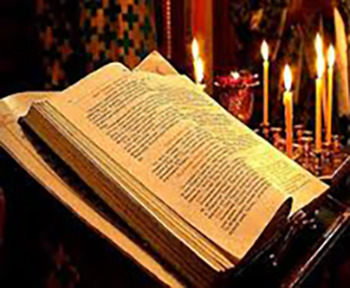
LUKE 24:36-53
36 Now as they said these things, Jesus Himself stood in the midst of them, and said to them, "Peace to you." 37 But they were terrified and frightened, and supposed they had seen a spirit. 38 And He said to them, "Why are you troubled? And why do doubts arise in your hearts? 39 Behold My hands and My feet, that it is I Myself. Handle Me and see, for a spirit does not have flesh and bones as you see I have. 40 When He had said this, He showed them His hands and His feet. 41 But while they still did not believe for joy, and marveled, He said to them, "Have you any food here?" 42 So they gave Him a piece of a broiled fish and some honeycomb. 43 And He took it and ate in their presence. 44 Then He said to them, "These are the words which I spoke to you while I was still with you, that all things must be fulfilled which were written in the Law of Moses and the Prophets and the Psalms concerning Me." 45 And He opened their understanding, that they might comprehend the Scriptures. 46 Then He said to them, "Thus it is written, and thus it was necessary for the Christ to suffer and to rise from the dead the third day, 47 and that repentance and remission of sins should be preached in His name to all nations, beginning at Jerusalem. 48 And you are witnesses of these things. 49 Behold, I send the Promise of My Father upon you; but tarry in the city of Jerusalem until you are endued with power from on high. 50 And He led them out as far as Bethany, and He lifted up His hands and blessed them. 51 Now it came to pass, while He blessed them, that He was parted from them and carried up into heaven. 52 And they worshiped Him, and returned to Jerusalem with great joy, 53 and were continually in the temple praising and blessing God. Amen.
LUKE 24:36-53
36 Now as they said these things, Jesus Himself stood in the midst of them, and said to them, "Peace to you." 37 But they were terrified and frightened, and supposed they had seen a spirit. 38 And He said to them, "Why are you troubled? And why do doubts arise in your hearts? 39 Behold My hands and My feet, that it is I Myself. Handle Me and see, for a spirit does not have flesh and bones as you see I have. 40 When He had said this, He showed them His hands and His feet. 41 But while they still did not believe for joy, and marveled, He said to them, "Have you any food here?" 42 So they gave Him a piece of a broiled fish and some honeycomb. 43 And He took it and ate in their presence. 44 Then He said to them, "These are the words which I spoke to you while I was still with you, that all things must be fulfilled which were written in the Law of Moses and the Prophets and the Psalms concerning Me." 45 And He opened their understanding, that they might comprehend the Scriptures. 46 Then He said to them, "Thus it is written, and thus it was necessary for the Christ to suffer and to rise from the dead the third day, 47 and that repentance and remission of sins should be preached in His name to all nations, beginning at Jerusalem. 48 And you are witnesses of these things. 49 Behold, I send the Promise of My Father upon you; but tarry in the city of Jerusalem until you are endued with power from on high. 50 And He led them out as far as Bethany, and He lifted up His hands and blessed them. 51 Now it came to pass, while He blessed them, that He was parted from them and carried up into heaven. 52 And they worshiped Him, and returned to Jerusalem with great joy, 53 and were continually in the temple praising and blessing God. Amen
#orthodoxy#orthodoxchristianity#easternorthodoxchurch#originofchristianity#spirituality#holyscriptures#bible#gospel#wisdom#saints
6 notes
·
View notes